
Charities Commission Number: CCC29446 Keeping On On THE OFFICIAL VOICE OF AGE CONCERN CANTERBURY Vol 121: Autumn 2024 Phone (03) 366-0903, Fax: (03) 365-0639, Email: team@ageconcerncan.org.nz, www.ageconcerncan.org.nz Life Stories, Pages 16 and 17
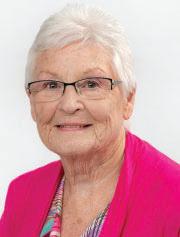
It is hard to believe that we are at the end of January as I write this. I hope you all had a very happy, safe and enjoyable Christmas with friends and family and are now well settled back into the routine of 2024.
In the hot weather we have been having, you need to be aware that hydration is very important for both you and your garden. You need frequent drinks (both hot and cold) throughout the day. Water your garden in the morning so your plants get the benefit before it gets too hot, watering in the evening or at night leaves the plants at risk of rotting by being too wet for too long.
Here are my adventures for you this time. Keep up the bus trips they are free for Goldcard holders after nine on weekdays and all day at the weekend. The Orbiter is especially good to take you to a mall that you might not have been to before, and there is no worry about parking. Visit Woodham Park, it is on Woodham


Page 14,
Page 20,
Page 23,
Road near Gloucester St, and the Canterbury Tennis Centre, Wilding Park, is right next door. Woodham Park has a variety of mature trees and open spaces to sit and have a picnic, there are no coffee carts or other food trucks allowed in there, so you need to take your own.
Orton Bradley Park is a bit further away on the peninsula but well worth a trip. You can sit under the trees or go for a walk up the hill on the track or just watch the harbour if you do climb a short way up the hill.
Halswell Quarry Park is also worth a visit. There are tracks to walk or just sit under a tree and enjoy the picnic that you have taken with you. There are gardens from various countries planted with their native plants and decorated in the style of their country, which is worth a look.
There are free weekend concerts in the Botanic Gardens on Sunday afternoons either in the band rotunda in Hagley Park or on the Archery lawn in the gardens.
Take care and look after yourselves and if you have a neighbour who lives alone you might like to invite them in for a cup of tea.
Trish Adams President
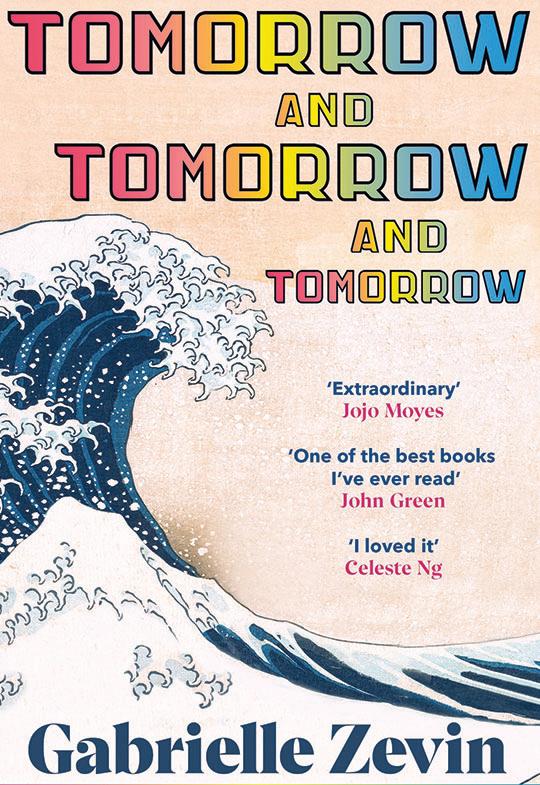


When I was thinking about what to write in this column, I wandered out from the Loftus Street entrance to Age Concern Canterbury, to find Trudy, one of our Community Connectors, planting some lettuces in our raised beds. This is something that happens seasonally, and staff, volunteers and visitors are all welcome to harvest the vegetables. Sometimes, the veges have been taken overnight, gone who knows where to be eaten, and that’s okay too – they’ve gone where the need is.
For me, that’s what Age Concern Canterbury is about – we plant seeds (ideas) and tend them (put them into practice through our everyday work) and our harvest (services that benefit older people) are available for anyone who needs or wants them.
I’m finding it’s easy at the moment to feel overwhelmed by bad news headlines from around the world. It's easy to become disheartened and feel powerless in the face of these events, but in my opinion, it’s especially important to celebrate the good things we can do together to improve the parts of the world we can influence. For all of us at Age Concern Canterbury, that’s working to improve and enhance the wellbeing and dignity of older people across the region. That’s why we come to work every day, and that’s what we’re determined to do through 2024.
This year, we will also be reviewing and rethinking our strategic plan. This is the document that lays down our guiding principles as an

organisation. It’s a document that we revisit and rewrite every few years, a process that offers us an opportunity to consider our values and sharpen our intent. In February, our staff and Board will gather to think about our important objectives: renewing our commitment to our existing services and thinking about how we can strengthen them and develop them further. The resulting document will guide our work for the next few years and provide a bit of a roadmap for Age Concern Canterbury as a whole and for me as CEO.
I’m interested to ensure that we’re doing all we can to meet the needs of all older people in Canterbury: What can we do better? What should we be doing more of? How can we improve? What should be our goals for the next five years? If you’ve got some answers to these questions, feel free to email me (ceo@ageconcerncan. org.nz), or leave a note at Reception, or drop by our offices at 24 Main North Road for a chat. It’s exciting and challenging to hear new ideas, and important for the quality of our work that we’re able to listen to all sorts of voices (all the time, not just this month).
The idea is that our strategy will be a living document that clearly expresses our values and guides our decision-making. It’s both a bit daunting to consider, but also an exciting opportunity for all of us to approach together. This is probably one gardening metaphor too many, but we’re getting our garden ready to plant, and choosing which seeds will be most fruitful in the years ahead. Let us know what you think we should be sowing.
Happy New Year, everyone!
Greta Bond Chief Executive
does publication of an advertisement imply endorsement by Age Concern Canterbury.
FEBRUARY 2024 Keeping On eeping On 2 A WORD FROM THE PRESIDENT FROM THE CHIEF EXECUTIVE Book your advertising for Keeping On May 2024. Deadline for ad bookings is Friday, 26th April 2024. Contact Anna-Marie on 331-7804. OFFICIAL MAGAZINE OF AGE CONCERN CANTERBURY (INC) Keeping On On Keeping On is distributed by Age Concern Canterbury to Christchurch Malls, Senior Citizen Clubs and Groups, Libraries, Medical Centres, Rest Homes, Hospitals and Institutions, Housing Complexes and Agencies working with older people and individuals. Keeping On is published quarterly in February, May, August and November each year. Written contributions for consideration can be emailed to the Editor at dmcgrath@ageconcerncan.org.nz or contact Deirdre on (03)366-0903. The Keeping On Team: Deirdre McGrath - Editor, Mike CreanJournalist, June Peka - Journalist, Anna-Marie Hunter - Advertising Representative/ Desktop Publisher. Keeping On is printed by Inkwise, Rolleston. Age Concern Canterbury is very grateful for the support we receive from our advertisers. Without advertisements this publication could not survive. Some of our advertisements are the traditional type and others include advertorial (an advertisement that’s written in the form of editorial content). To be transparent to our readers each of these advertorial pieces is labelled with the symbol A. Views and opinions expressed in Keeping On are not necessarily those of the Editor of Age Concern Canterbury. Neither
CONTENTS
Directory
Trades
Cafe Groups and Christmas outings
Make
date with serenity
a
Downsizing? We
to be tipped out
Join WEA for reliable information
Page 26,
refuse
Page 27,
Health Promoter Chit Chat
32, My two cents by June Peka
Page 31,
Page
Page 3, Eric Hunter, the Bionic Man
Page 13, Never too old to make new friends
Page 11, My book club
Page 16 and 17, Life Stories
Eric Hunter - the Bionic Man
by Mike Crean
A Christchurch nonagenarian is New Zealand’s leg-strength legend. He is Eric Hunter. Traumatised as a youngster, he became a prolific distance runner and cyclist for more than 60 years.
Known widely as “an icon of early Coast to Coast races”, Eric carved a remarkable record for competitive running and cycling. The 90 year-old remains a slim figure, alert, active and with a strong memory. He rides his bike regularly and walks powerfully up and down steep tracks in the Port Hills with his walking companion Tosca, a beautiful whippet. He and the dog share qualities of lightfootedness and athleticism.
With a laugh Eric refers to himself as “The Bionic Man”. Enduring many crashes and strains he has had multiple pins, screws and plates inserted in various joints. He has learned to prefer biking to running –“It’s easier on the body,” he says.
Born in Liverpool in 1933, Eric’s early childhood was traumatic. He spent night after night, for months, sleeping in the family car, outside the city. As German bombers blitzed the Liverpool docks in World War II, his father drove the family to safety in the country each night. When the bombing became more widespread, Eric was evacuated to a village family further from home. He was unhappy there and ran away one night.
He left school at 16 and started work as an apprentice chef in Liverpool. Having qualified, he worked in hotels around England and Scotland. Then he moved into management, in restaurants and ballrooms as well as hotels. He married fellow Liverpudlian and cyclist Maureen Kiley in 1962.
The offer of a job in New Zealand appealed and, in 1964, Eric and Maureen landed in Auckland. The couple came by plane, which was unusual at that time. They paid

full fares. “We were not ten-pound poms,” he stresses.
On arrival Eric found the job he had been offered no longer existed. No sweat; within two days he had picked up another hotel management position. However, just three years later he and Maureen returned to the UK to manage hotels in London and Glasgow. Then, in 1969, they tried New Zealand again, with their newborn daughter “Pip”. This time they stayed.
Eric says he learned much about Kiwi culture and customs, especially when he took over management of the country’s busiest pub, the Glue Pot, in Auckland. Pubs had to close at 6pm on weekdays and Saturdays then. Opening on Sundays was banned. But were these laws observed? Eric answers the question with: “We learned an awful lot about New Zealand drinking habits.”
His career in New Zealand involved managing a staggering list of quality hotels. In one case, he was approached by Sir Henry Kelleher, head of the DB brewery and hotels
company, with a job offer. After a short term as a deputy manager, he proceeded to run DB hotels. Following that, he managed many hotels, from Chateau Tongariro in the north, to Aoraki/Mt Cook Hermitage in the south. In Christchurch he opened and managed the Avon Motor Lodge. He managed The George Hotel, on Park Terrace, for 17 years. The list could go on…
Eric had been a successful competitive cyclist in England. He won selection in the England B cycling team for the Isle of Man Tour and the Tour of Ireland. He rode in other races and was chosen as nontravelling reserve for the top England team in the highly ranked Tour of England.
To balance his lifestyle in New Zealand he mounted his bike again. An athletics coach spotted him and suggested he join the University of Canterbury Athletic Club as a runner. He was only too happy to become part of the club. That was in 1978, when he was 45 years-old. From that point he re-launched his impressive

competitive riding and running career. His list of sporting achievements is as long as his management career. It included many highlights. He completed 11 Coast-to-Coast races with respectable times, the last one in 2007 when he was 74. In 1983 he was part of the team that won the Coast-to-Coast event.
He ran several marathons, with times around 2-hours, 35-minutes. In 1980 he broke the Great Westland Marathon record at 2-hours, 30-minutes (a respectable time for leading runners today). He completed his first half-marathon, with no preparation, in 1-hour, 35 minutes. At 53, he won a World 25km road race in 1-hour, 24 minutes - and then, just 10 days later, ran a marathon in 2-hours, 30-minutes, 51-seconds.
As Eric’s age increased, so did his distances. In 1986 he won a veterans’ four-day Bluff to Picton race in a twoman team. He completed a second Bluff to Picton six-day race three years later. Eric also toured overseas and raced in Germany, Austria, Hungary and Slovakia.
Eric is well-known and respected by New Zealand cyclists and distance runners. About 100 people attended his 90th birthday party at Living Springs. A close friend was Olympics runner Jack Foster, at whose funeral Eric was a pall bearer.
While we are chatting, Eric hears a knock on the door. In steps former Coast-to-Coast winner John Howard, checking how his old friend is keeping. Others keep an eye on him too, for this is no rest-home. His wife Maureen has died but is memorialised by her own attractive landscape paintings hanging on the walls. His only child, Pip, lives in Australia with her only child. But Eric is never alone; Tosca the whippet adores him.







Keeping On eeping On 3 FEBRUARY 2024 robyn.j@transitionnavigators.co.nz 0800 487 267 www.transitionnavigators.co.nz ADVANCED LIFESTYLE PLANNERS
NAVIGATORS Discuss your Life Stage Plan with Robyn Let Transition Navigators enhance your wellbeing as we support you by finding your most appropriate living place Considering moving? Feeling overwhelmed thinking about your options? Need Advice? * Retirement villages * Asset protection * Wills & Trusts * Enduring powers of attorney * Property sales and purchases * Relationship property issues Ph: 366-5169 Home visits at no extra charge We are here to assist you in all legal matters STEEL & CO BARRISTERS & SOLICITORS 111 BEALEY AVENUE, CHRISTCHURCH • FREE Appt & Hearing Test incl. programming & try • Latest Hi Tech/Premium models made in USA in stock • Feature 4 programs incl. background noise & TV • Independent & caring advice • We will save you money Ph 0800 443 274 SHOPRIDER “Simply the Best” WHEELCHAIR SCOOTER SALES & SERVICE Variety of new and used scooters, wheelchairs and walkers Contact: Gerald & Christine 28 Years of friendly service with a guarantee SPECIALS Phone 383 1364 or 021 183 1177
TRANSITION
Eric Hunter, widely known as “an icon of early Coast to Coast races.”
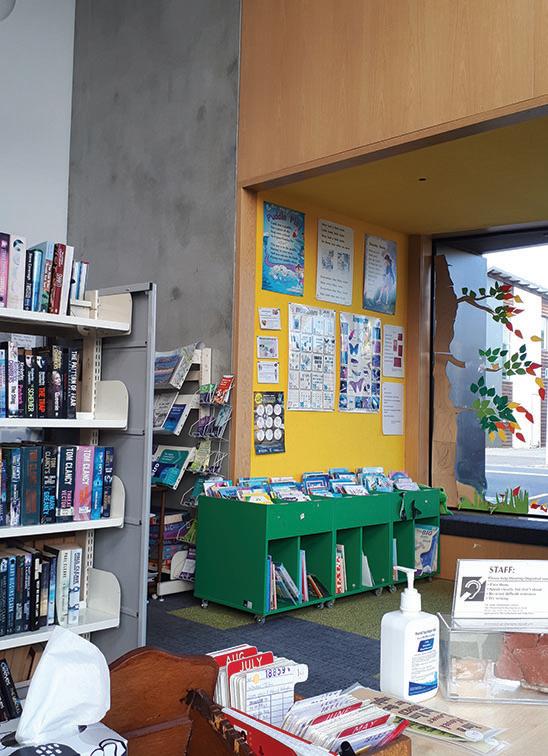
Woolston Community Library
Good selection of books: new releases, large print, and childrens’ books.
$2.00 to join, $1.00 a book for 3 weeks, children free.
Free use of laptops and free Wi-Fi.
Open: Monday to Friday, 11.00am to 3.00pm, Saturday, 10.00am to 12.00noon.
woolstoncommunitylibrary@gmail.com
Woolston Community Library, 689 Ferry Road, Woolston.
The cost of dying crisis
New Zealand’s cost of dying crisis means dying has become unaffordable for many.
The average cost of a Kiwi funeral is around $10,000 but according to NZ Seniors, only 5 percent of us preplan our funeral. So, who gets left with the bill?
While it is common practice for family members to pay for funeral costs on the understanding they will be reimbursed from the Estate, beware. Once an invoice is paid it ceases to be a debt, and there is no guarantee of reimbursement unless the executors or beneficiaries agree.
Setting up a funeral trust can be a very good option. Your lawyer can help you do this, and it’s a legally allowable way to release funds for residential care assessments so has some real benefits.
Having the funds there also means you can get a discount for paying the funeral costs up front. Most funeral homes offer a pre-paid funeral option too but check first that its inflation adjusted so there are no surprises.
Don’t forget the humble Will
The humble Will, often undervalued and underthought of, remains a robust tool for setting out your express wishes and ensuring the payment of any debts are made from your Estate.

If there is a Will, banks will usually allow for the payment of funeral costs from a deceased’s account. This can be done relatively easily by providing the bank with a copy of the funeral invoice and completing a form signed by the Executor of the Will.
Things can get sticky though if there is no Will.
Without a Will, funds of the deceased will be frozen on notification that an account holder has died, and the deceased’s estate goes into intestacy. That means the distribution of your assets will be determined by law and how they are distributed may not be at all how you, or the deceased, would have wished.
Dying is one life event that none of us can avoid. Planning ahead has never been more important.
Scam Alert
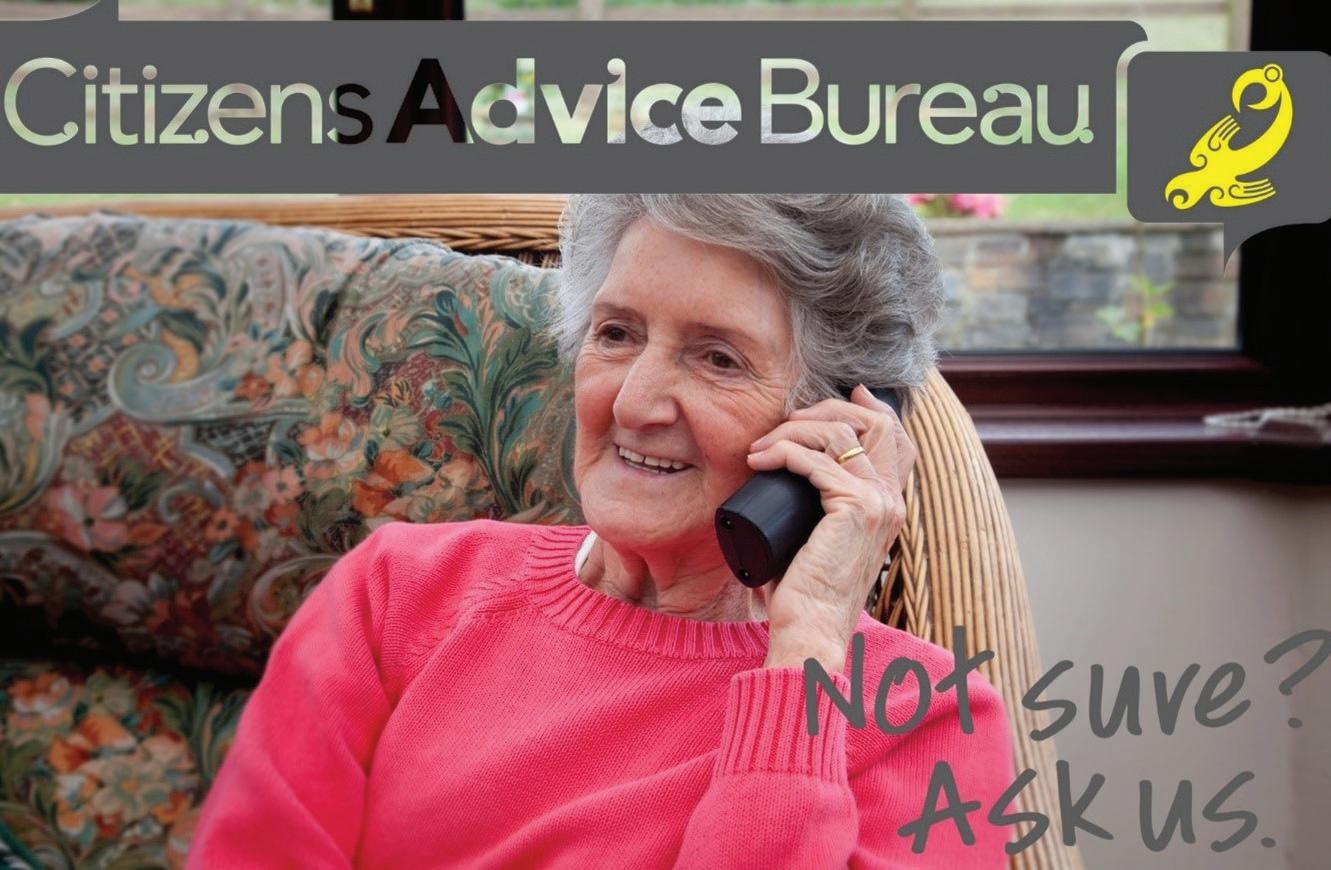
Lynley* is eighty-one years old, though she is so bright, so sure of herself, so up with technology, you’d take her for younger, she thinks. She has a Facebook account so she can keep up with her grandkids and has familiarised herself with the Internet, because, well, you have to nowadays. Every blasted organisation you deal with tells you to go to dub dub dub something or other.
Although Lynley doesn’t know https from 2 factor authentication, she isn’t deaf to warning bells, so whenever an email arrives that is riddled with spelling mistakes or poor English she marks it as junk. All the same, the spam floods in like unwanted tears. “Waka Kotahi” tells her her rego has expired even though she doesn’t own a car. “NZ Post” fails to deliver a parcel she isn’t expecting. And her “Netflix” membership – whatever that is – has expired, again.
I’ve lost my phone. XOXO J’, she knew it wasn’t from her son because even though he used his familiar greeting and sign off, he hadn’t used the family safe word. The family had put a safe word in place after her daughter was fleeced in the fakeinvoice-new-bank-account trick.
She’s bemused “they” pinch her words, her generation’s words, and give them new meanings. Stalking is like deer stalking, only it’s stalking people, in person or online. Phishing is like fishing, dangling a bait to see what bites. Smishing is the same thing, except in a text message.
Then, out of nowhere Lynley is preyed on by a medical scam. A cold caller, a meany who takes advantage of her at a time when she is tired and under pressure, and cons her into doing something that if she’d sat down and thought about it, she wouldn’t have.
She could’ve beat herself up about it. She could’ve kept it from her family. Or she could simply contact Citizens Advice Bureau (www.cab. org.nz) for practical, confidential and free information.














Scammers like nothing better than to stick a toe in the door, like an encyclopaedia salesman. Once they have a foot in the door, they clear out your bank account quicker than Mrs Woolf clears out the afternoon tea trolley.












After her neighbour was sucked into a romance scam, Lynley armed herself with fraud awareness tips from www.consumerprotection. govt.nz, https://sorted.org.nz/ guides/protecting-wealth/fraudand-scams and https://www. ageconcern.org.nz/Public/Public/ Info/LifeStyle/Technology_and_ the_Internet.aspx.
Now she never, ever clicks on a pop-up ad. When a nice man phoned and claimed to be from her bank, she promptly hung up, contacted her bank directly and ask if they had contacted her. Sure enough, they hadn’t.
And when she got a text from a strange number, saying ‘Hi Mumsie,
Get in touch on 0800 367 222 (0800 FOR CAB) to talk to a real person. Or pop into a location across Christchurch and Selwyn:
• Fendalton Library, 4 Jeffreys Road (351 7804).
• Hornby Community Care Centre, Goulding Ave (349 5236).
• upstairs in the library at The Loft, Eastgate Mall (Tuesdays, 11.00am to 2.00pm).
And new:
• in the SBA building,133 Brighton Mall, New Brighton (366 6490).
• at Te Ara Atea Community Centre, Rolleston (Tuesdays, 11.00am to 1.00pm).
• at the University of Canterbury Laws Building (Thursdays, 5.15pm to 7.15pm).
FEBRUARY 2024 Keeping On eeping On 4 Knowyourlovedonesarebeingtakencareof, nomatterwhathappens. aspiringlaw.co.nz/Wills BenjaminFranklingotthatright.It'simportant tohaveawillinplaceatallstagesofyourlife. 0800277529 Ourfreeonline Nothingiscertainexceptdeathandtaxes toolcanhelpyougetstarted: 'willplanning'
A
Steph Gifford
Experience Central Otago’s unique character
by Mike Crean
Four hours south from Christchurch on Highway 1 brings you to the town of Palmerston. Turn right at the signposted intersection pointing inland on Highway 85. Soon you will be in Dunback. High in the hills to your left is the legendary plateau of Macraes Flat. Give it a miss this time but keep it in your futures plan. It’s worth it.
Soon after Dunback you face the challenge of The Pigroot. This is the colourful name of a steep road that made draughthorses foam and Model A Fords boil. Relax; today’s cars handle it easily. At the top, you are in The Maniototo district. Proceed to Ranfurly, a town in a setting that makes you think you are in Australia.
Here you will find the Central Otago cycle track, with sweating, puffing, but ebullient cyclists resting before tackling the next stage. The track runs on the former railway line that ran from Dunedin to Cromwell until the 1970s. Ranfurly was about half way. The railway station is worth a visit.

A short distance from Ranfurly a brief detour leads to an older town. Naseby is known today for its modern indoor curling stadium but it still gives hints of pioneering days and gold diggings.
Back on Highway 85, you notice road signs for places with names ending in “burn”. There was Kyeburn, before Ranfurly. Now you spot Wedderburn. Then there’s Idaburn. More “burns” are dotted around the region, reminders that Otago was a Scottish settlement.
Just past Idaburn you must consider turning left and passing through the Ida Valley. This includes Oturehua, a small town that competes with nearby Ophir for New Zealand’s lowest mainland temperatures. But, be warned, some of the country’s hottest days have dawned here too.
A better choice is to continue on Highway 85. When you come to a

sweeping left-turn, you will see a side-road on the right that takes you to St Bathans, one of Central Otago’s many gold-rush towns. St Bathans sits above the Blue Lake, with its white cliffs. This is a tiny town of tall tales, historic buildings and ghost stories based on the Vulcan Hotel.
Past St Bathans you will notice a sign suggesting a Welsh influence, rather than Scottish. It points to a small valley called Cambrians, where early Welsh coal and gold miners lived. Some of their simple homes still stand. In the mining days Welsh and Irish diggers waged civil wars. Not everyone was Scottish.
Vistas in this area appear in many of famous artist Grahame Sydney’s landscapes, notably visions of the Hawkdun Range. Sydney must have been inspired by the various ranges of this region with such down-toearth names as Rough Ridge and Raggedy Range.
The side-road brings you back to Highway 85, at Becks. An early pub here was run by a man named Beck. As a publican, he was the most important resident. His old stone pub stands in ruins, opposite the more recent hotel. In five more minutes you reach Lauder, which is another of those almost deserted townships.
Next is the busy town of Omakau. Turn left here, cross the Manuherikia River and enter Ophir. Photos and films have made Ophir famous, just as gold did in the 1860s. Heritage buildings stand along the main street. Walk there and breathe the aroma of wild thyme that grows in profusion on the rocky hills beyond. Just north of the town the classic Daniel O’Connell Bridge returns you to Highway 85.
Twenty minutes later you have left the land of disappearing villages and reached the “capital” of Central Otago, beautiful Alexandra. Here you meet the mighty Clutha River. Slightly upstream is the fast-growing town of Clyde with its lovely 19th-Century main street.
The giant Clyde Dam broods over the town but you will drive even higher, through the Cromwell Gorge. Imagine, as you go, the old road that is now many metres below the waters of Lake Dunstan. Cromwell at last - your worthy destination, adorned with grape vines and tourists. Time to seek the Lindis Pass; you’re going home.
For fuel and, food, Palmerston, Ranfurly, Omakau, Alexandra, Clyde and Cromwell have the essentials. Some have hotel/motel accommodation or B&Bs nearby.

offering
to own and your place to live. 75 Belfast Road, Christchurch 7 2 3.6 9.5 10 7 7 Kaiapoi Waimakariri River The Groynes Christchurch Airport Supa Centre Belfast Northlands City Centre The Palms 12 Brighton Beach Bottle Lake Forest springgrovevillas.co.nz 0800 683 797 Rangiora 20km
Plus, at Spring Grove Lifestyle Village you own your own home so you will benefit from capital gains and avoid any deferred fees common in the majority of other retirement village models.
the stress, confusion and unnecessary cost out of retirement planning and living, and enjoy an optimal quality of life in
and built by Mike Greer Homes, each home is carefully crafted, superbly finished and comes with industry-leading quality guarantees. Make Spring Grove Lifestyle Village your home
Keeping On eeping On 5 FEBRUARY 2024 Own your own home in a connected community.
Grove Lifestyle Village offers a new option for semi-retirement and retirement living.
Spring
close
over
safe,
Set in beautiful landscaped grounds
to all amenities, the village offers people
55 years of age a range of new homes in a
welcoming and vibrant community environment.
Take
your later years.
Homes at Spring Grove Lifestyle Village range from one bedroom terraced apartments right through to three bedroom standalone homes, a wide array of options to suit all tastes and lifestyles.
Designed
Central Otago will “stiffen the sinews and summon the blood”. Try it. Take a few days to explore parts of this vast area. Do it soon, for every day new developments are changing its unique character.

Is my will valid?
Setting up a Will is crucial to ensure your property is distributed according to your wishes after your passing. Without a valid Will, your family members may need to make an application to the Court in order to be able to deal with your estate and distribute your assets. The Wills Act 2007 sets out the requirements that a Will must meet in order to be valid.
In order to be valid, a Will must be in writing, signed by the Will-maker, and witnessed correctly by two witnesses. Failure to meet these requirements renders the Will invalid. In the case of invalid Wills, an application can be made to the High Court to seek that a document is declared a valid Will. The application must be served on all affected parties, including those people whose gifts from the estate may change if the application is granted.
To declare a document a valid Will, the Court must be satisfied that the document appears to be a will,
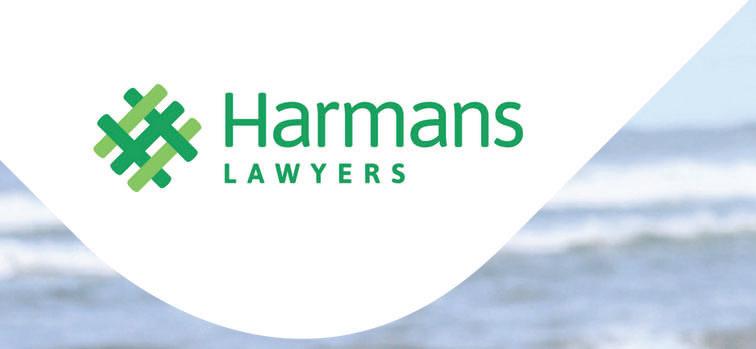
does not comply with the validity requirements, and expresses the deceased’s testamentary intentions. This means that the document must reflect the deceased person's wishes for the disposition of their property.
Examples of documents that the Court has declared valid Wills include draft Wills, instructions to lawyers, handwritten notes, a digital document on a computer, and transcripts of audio recordings.
While it is possible to make an application to the High Court to declare a Will valid, it can be a costly and time-consuming process.
To avoid the need to make such an application, it is important to seek legal advice to ensure your Will meets the requirements of the Wills Act 2007. If you require assistance drafting a Will or would like more information about making an application to validate a Will, please contact the experienced legal team at Harmans. A
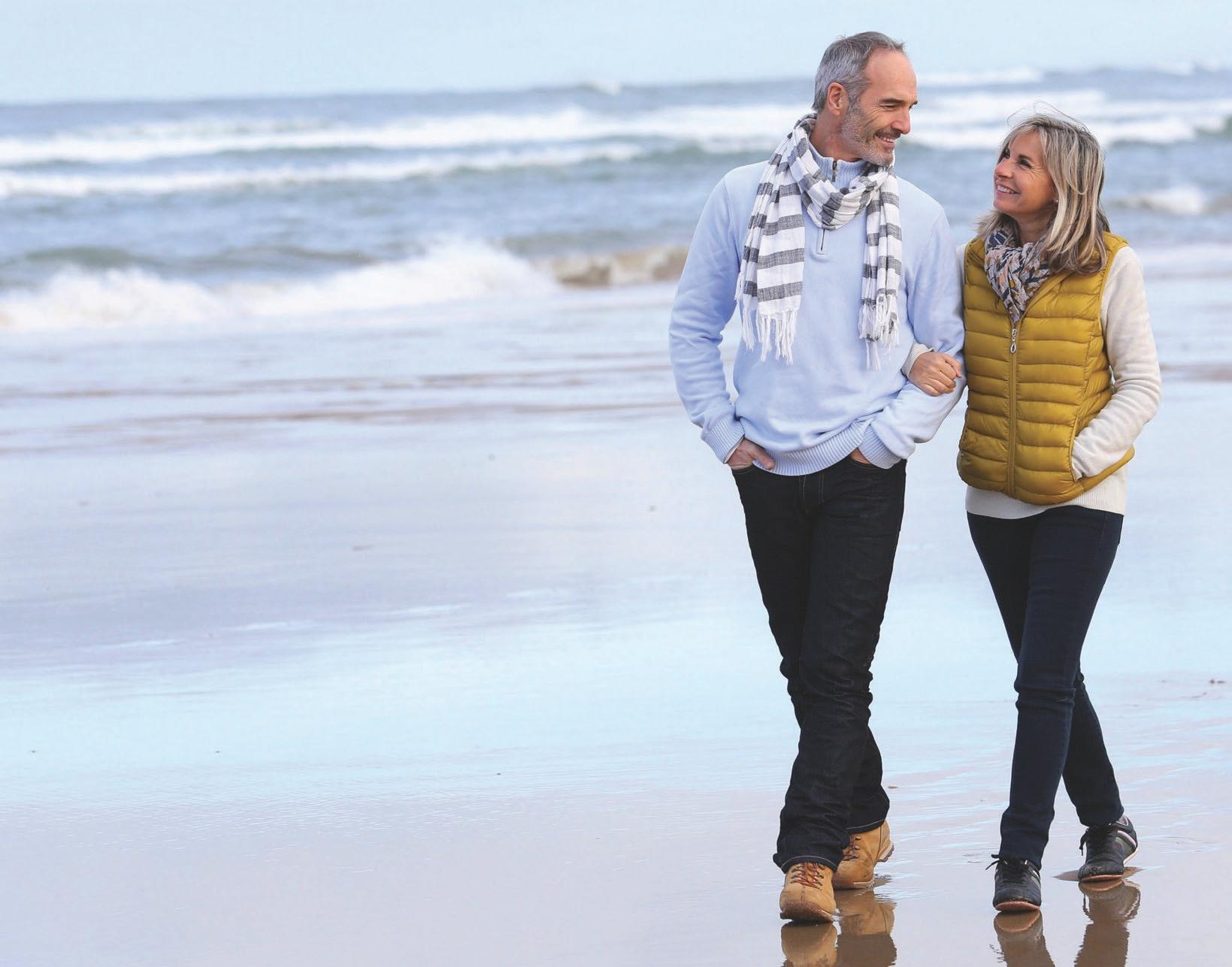

A project run by occupational therapists/kaiwhakaora ngangahau in the Older Persons Health and Rehabilitation (OPH&R) Community Therapy Service has made a big difference for people requiring their expertise.
The community occupational therapists (OTs) work within interdisciplinary clinical teams, based at The Princess Margaret Hospital. They support people who are living with disability or aged-related conditions, with a strong focus on enabling them to remain living well in their own homes and communities.
Their work includes assessing people’s ability to function at home and participate in meaningful activities, providing advice on safety and independence, accessing specialised equipment, and coordinating housing modifications if needed. The OTs work alongside Allied Health assistants/kaiāwhina, who have completed additional training to support this work.
The demand for this service is high and the teams recognised the need to think outside the box, to meet the needs of our community, says Associate Director of Allied Health, OPH & R Community Teams

Leeanne Yeoman.
“One idea was providing therapy outside of usual weekday hours, which led to a trial of offering OT and assistant visits to people in the weekends over a six-week period.”
The project has had a significant impact on waiting time for OT input, with the longest-waiting client numbers reduced by almost 40 percent.
“The clients visited during this time were appreciative of the flexibility of appointment options, as well as the fact that their families were more available to be there at the visit.”
The staff working weekends also enjoyed the opportunity to connect with colleagues that they normally wouldn’t work alongside, sharing different ideas and learnings.
The project was first run in September and October 2023 and due to its success another six-week block of weekend work is being run. When this one ends wait lists will be monitored and further opportunities considered as required.
“A very big thank you to everyone who made this project possible. We hope to explore how applicable this is across other areas of community work,” Leeanne says.
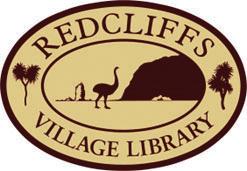
FEBRUARY 2024 6 Keeping On eeping On Contact VictoriaAgnew P (03)3797835 E victoria.agnew@harmans.co.nz A 79-81CashelStreet,CentralCity,Christchurch8011 www.harmans.co.nz OurfriendlyandexperiencedSeniorsLawteamoffersspecialised legaladvicesoyouhavepeaceofmindandfeelconfidentwhenit comestomakingdecisionsthatarerightforyouandyourfamily. OurSeniorsLawteamcanhelpwith: Protectingyou throughallstages oflife Wills Trusts FuneralTrusts OccupationRightAgreements EnduringPowersofAttorney RestHomeSubsidies EstatePlanning AssetProtection SaleandPurchaseofProperty WehavetwoconvenientlocationsoneintheCentralCity,theotherin Papanuibyappointment.Ifyoucan’tgettous,weofferahomevisit servicewherewecancometoyou.
Serving our community for over 100 years Check out our: • New Books purchased EVERY month • Huge range of Fiction and Non-fiction • Awesome selection of Children and Young Adult books • Room for Hire Open: Mon.to Fri. 10am-4pm, Sat. 10am-12:30pm, Sun. 2pm-4pm 91 Main Road, Redcliffs. Christchurch. www.redcliffspubliclib.wixsite.com/redcliffslibrary Facebook.com/RedcliffsPublicLibraryInc
OTs embrace
working
Some of the Community Occupational Therapy team, from left, Allied Health Assistant Tianna Curtis, Community OT Team Leader Ashleigh Green, Advanced OT, Ros Rossiter, Lindsey Lewis (OT), Allied Health Assistant Donna McRoberts and Associate Director of Allied Health OPH&R Community Teams Leeanne Yeoman
Community
new ways of
Only once a week!
by Harmony

“You have to put paper, cans, and glass bottles into this green bin and rubbish into this black bag…. “ It was 2002, and two days into moving into my rented house after I emigrated to New Zealand. My kind Kiwi neighbour was showing me how to deal with rubbish.
“What time they will collect rubbish?” I said “they”, meaning the rubbish trucks, and I spoke English with Mandarin grammar.
“Thursday. You must put your rubbish on the roadside on Wednesday….”
I asked her “what time”, and I supposed she would tell me 7pm, 8 pm or similar. Even though my English listening was not very good, I was sure ‘Wednesday’, ‘Thursday' were not the right answers. So, I asked her again “Tomorrow they will collect at what time?” I already did not care about what kind of grammar!! I was completely confused and worried.
“No, nobody will collect rubbish tomorrow, Thursday only!”
I stared at her, “You mean, only Thursday, only, only once? “I asked her again “Once a week?” I cannot imagine it. At that time, I pictured a terrible city with spilled rubbish all over the ground….
Oh! No, it wasn’t going to happen in New Zealand. Two weeks later, I had figured it out! In my home country Taiwan, rubbish was collected every day at dusk or in the evening. I could not imagine what would happen if the rubbish was stacked up for one week. The smell….
But Taiwan was my first and only experience of rubbish collection. The reality is that every system has to reflect its environment. So the different operating systems, the tropical climate and the crowded residential buildings in Taiwan have determined the frequency of rubbish collection.
Taiwan is located in the subtropical area with over 30 degrees every day in summertime. How can you keep kitchen leftovers in your small kitchen or back balcony for one week? And most Taiwanese live in an apartment without a garden or backyard. How can you stack up one week's worth of rubbish in your small living space?
After two weeks, I had realised the colder weather, and the big backyard
were really helpful to New Zealand’s rubbish collection.
Collecting rubbish may seem sort of annoying as a daily routine. However, in Taiwan, for many people of my age, the memory of rubbish collection can be nostalgic. Normally it was after dinner, when the rubbish truck announced itself as nearby by playing the piano music “Maiden’s Prayer”.
Then, everyone knew it’s time to take today’s rubbish out. We brought our several plastic bags of rubbish, and stood on the roadside waiting for the rubbish trucks to drive to the nearby place. So the rubbish collecting song echoing every night with the rubbish collecting became the most familiar music for everyone in Taiwan for years. Even many years later, when we heard the sound of piano playing “Maiden’s Prayer”, we often looked around, found someone else of the similar age, and smiled at each other with understanding: “Yes, rubbish collecting time!”.
Rubbish trucks also stop at specific spots for people to throw their own bags of rubbish into the back. Even though now people can trace trucks through a smartphone app, some people still arrive at the collection spots earlier for a chat with nearby neighbours. So rubbish collection time becomes a good meeting time for socialising with the community.
Nowadays, I am used to pushing my two rubbish bins out once a week. But when I go back to Taiwan, I still enjoy listening to the melody of rubbish collection and seeing people talk and laugh when waiting for the rubbish trucks coming. During our election season, people often shake hands with candidates or receive election flyers from dispatchers when they are waiting for the rubbish trucks to arrive.
I now see that rubbish collecting is a good example of something. Whether rubbish is collected once a week or everyday are just two different ways in which people deal with their daily life. People always develop the most suitable strategies to fit into their different situations. So, cultural things, actually, are only about differences. It’s nothing to do with better or worse.
Maintaining your independence with Driving Miss Daisy
Keeping your independence is something that is very important to most people; they value being able to go about their daily life without feeling like they’re being a burden on family members or friends.
When your independence is compromised through disability or loss of your license, this can make life less enjoyable to begin with. However, there’s no reason that you can’t still remain in control of your life and do what you want to do at a time that suits you. Not using your car or using it less doesn’t mean that you have to stop participating in social and personal activities that you enjoy. Driving Miss Daisy NZ are proud to have partnered with Age Concern NZ on the recently launched ”Life Without A Car” booklet. Contact your local Age Concern or your local Driving Miss Daisy franchise for a free copy.
Studies have shown the importance of social interaction for maintaining optimal health and wellbeing. That can be as simple as a trip to the supermarket or coffee with
friends. Sometimes, it can be more adventurous and include trips further afield, as the heart desires.
Driving Miss Daisy provides assistance to help you to maintain your independence, and always aims to put the joy back in the journey. Your independence is key to us, and we love knowing that we’re making a difference in our clients lives.
Driving Miss Daisy accepts the Total Mobility Scheme card, giving you a 75% subsidy on your transport up to the regional cap. The Total Mobility Scheme is designed to assist clients with long-term impairments to access appropriate transport to meet their daily needs and enhance their community participation. For further information contact your local Age Concern, they are happy to help you find out if you are eligible and advise you how to apply.
Call us today to discuss your requirements we will take you wherever you want to go, at a time that suits you. Remember - you’re in charge!
Get out and about with Driving Miss Daisy

A
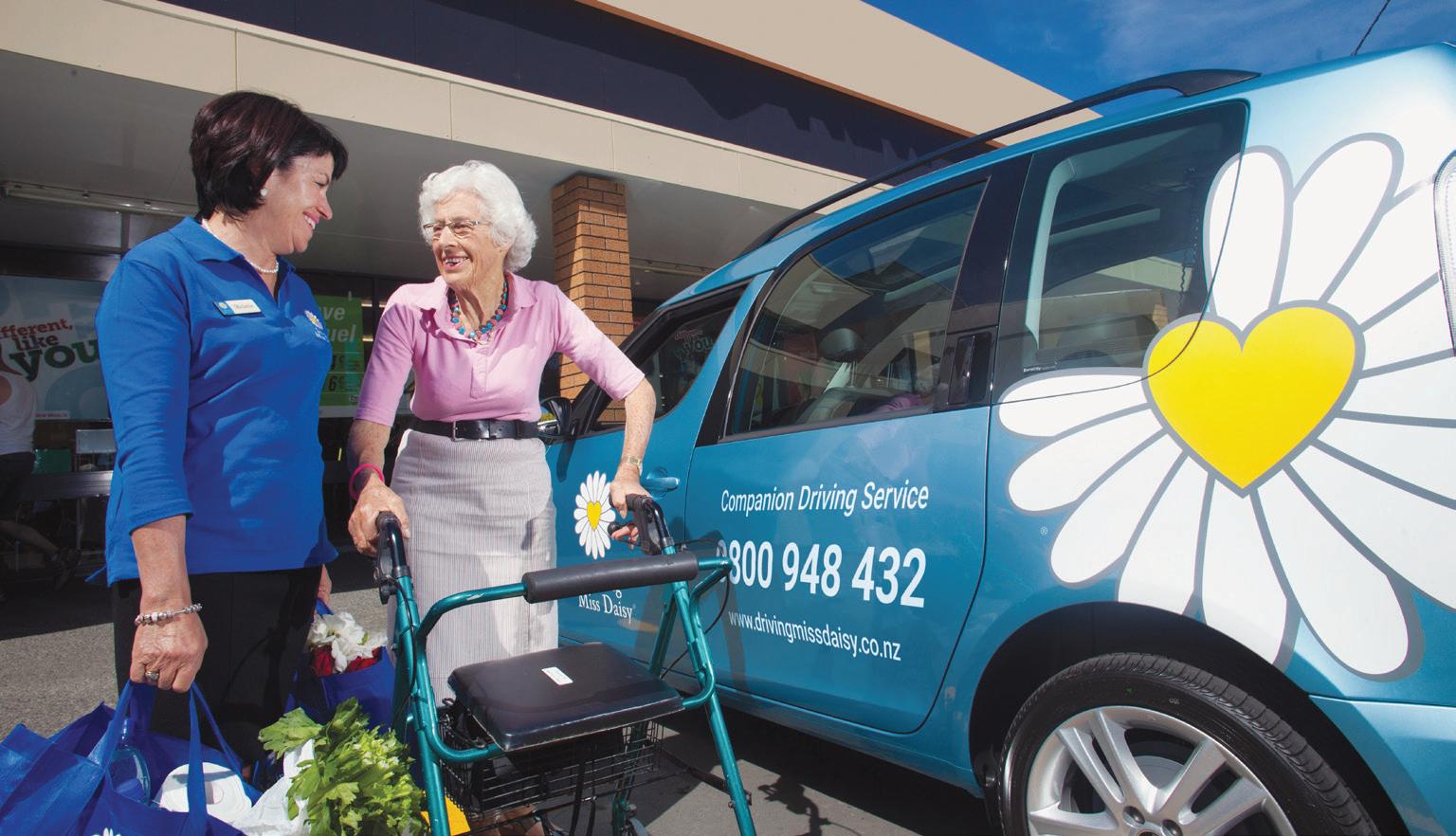

Keep your independence and freedom with our safe, reliable companion driving service.
We can drive and accompany you to:
•Medical and personal appointments • Grocery shopping
•Deliveries - e.g. take home meals•Airport drop-offs and pick-ups
•Companion outings•Or even transporting your pet!
Total Mobility Scheme cards accepted in most Canterbury areas, and an ACC contracted supplier.
Bookings are essential - call today and make your next outing a pleasure!
North Canterbury
Redwood/Burwood
Harewood
Riccarton
Selwyn
Ph: (03) 312 2936
Ph: (03) 352 4596
Ph: (03) 358 9466
Ph: (03) 323 6984
Ph: (03) 347 1009
St Albans Cashmere
Wigram
Ashburton
Timaru
Ph: (03) 423 9831
Ph: (03) 423 9778
Ph: (03) 325 7153
Ph: (03) 307 7237


Ph: (03) 683 1073 www.drivingmissdaisy.co.nz
Keeping On eeping On 7 FEBRUARY 2024
AGE CONCERN
IS LOOKING FOR
ENERGETIC AND RELIABLE GARDENERS TO MAINTAIN GARDENS

Fit, keen, energetic, reliable, own lawn mower and a current drivers licence.
Needed in all areas.
Casual work only.
Payment is on an hourly rate.
You are not alone
You are not alone! These are uncertain and unsettling times for all of us.
A listening ear - if you are stressed, worried or uncertain about your future, it can be very helpful to discuss the challenges you face with someone who listens well for understanding first of all, with no assumptions or judgements. Someone who will work in partnership with you to create solutions that are individually tailored, and a framework and plan for the future that you can imagine. Small steps moving forward at your pace lead to positive and beneficial changes and the creation of new healthy habits and lifestyle.
Dr Murray Cameron, Counsellor, is a Gold Card holder and senior, who works with people of all ages to create the future they want to have. Developing individual plans and goals, encompassing all of the important aspects of a healthy, happy and positive life including physical,
mental, family, spiritual, financial, work, leisure and pleasure aspects, leads to a happy and fulfilling future.
This can be particularly important when contemplating retirement or realising that your retirement is unsatisfying making you unhappy and disappointed. One definition of retirement is “to withdraw from life, withdraw from view”.
It might be more useful and satisfying for your health and wellbeing to redefine your place and role as a positive and contributing member of society and your community, including part-time work and volunteering if desired. This benefits both you and the community, contributing your skills, talents, knowledge and wisdom in new ways that also provide personal meaning and purpose in this next stage of your life.
If this sounds interesting and useful, please contact me. My details are in the advertisement below. A

COUNSELLING SERVICE FOR SENIORS
Do you have problems, worries, challenges as an older person, that you would like to talk about confidentially?
Are you feeling stressed, anxious or depressed and would like to work together with a trained, professional counsellor towards a positive future? Would you like to plan for a happy, healthy, fulfilling retirement/new phase of life?
I work with kindness, care and compassion and can come and meet with you where you live if necessary. My fees are negotiable and affordable and related to your financial situation.

Phone Dr Murray Cameron, Counsellor on 027 694 5275 or email: murray@afterhourscounselling.co.nz for further information or to make an appointment.
Test your crossword skills (240201 by RVT)
CLUES: (Legend: fl= combo due; * = optional cryptic due; §=sounds like; oo=anagram)
Across:
1. Liquid measurement (13), 8. Land for grazing (3), 9. Loathe (9),
10. Salting waiter (8), 11. Approving interjection (4), 13. Emergency (6), 14. Surround, 16. Regret (4), 17. Puzzlement (8), 20. ¶ Neat flowers (4,5), 20. Pretty flowers, 21. Popular final syllable (3), 22. Practising obedience (13).
Down:
1. Stops (5), 2. Turning story into play (13), 3. Large choral composition (8), 4. Epic poem (6), 5. ¶ Scold, bird, Track, Bar (4), 6. Explanation (13), 7. Opposite side to the wind (7), 12. * ∞ Miss Neat reordered as Chair explains order to resume chair (5, 3), 13. Climbing sprig (7), 15. * ∞ Is Mule for sustenance? (6), 18. Director from India (5), 19. Real (4).
SEE ANSWERS ON PAGE 22.

Membership
Age Concern Canterbury is funded by the community. Your support ensures the independence and wellbeing of older people is enhanced. If you wish to contribute to the work and services that Age Concern Canterbury provides please complete the form below.
I would like to: (please tick one box): Become a member ($20 per person, $30 per couple)
Become a friend ($10 per person) Make a donation
Note: Members have voting rights.
I would like to subscribe to the Keeping On newspaper, delivered quarterly, for a cost of $20.00. (please tick box)
I enclose: Membership Subscription $
Keeping On Subscription $
Donation $
TOTAL $
Note: Donations of $5.00 or more can qualify for a tax credit.
Direct credit to BNZ 02-0800-0188056-000
Mr/Mrs/Miss/Ms
First Names:
Surname:
Date of Birth:
Street Address:
Suburb:
City & Postcode:
Phone No.:
Email:
Signed:
FEBRUARY 2024 Keeping On eeping On 8
CANTERBURY
An appropriate level of fitness is required.
more information please phone
/Deb on
For
Liz
366-0903
1 2 3 4 5 6 7 8 9 10 11 12 13 14 15 16 17 18 19 20 21 22
Post to The Chief Executive, Age Concern Canterbury Inc, 24 Main North Road, Papanui. Christchurch 8053.
The health benefits of staying socially connected as we age
With the recent spell of hot, humid weather and spike in COVID-19 cases, I’ve been advising older people to take a little extra care out in our communities this summer.
However, despite these cautions, it’s still important to get out and about and interact socially, because social connection is also vital for mental and physical health.
Last November, the World Health Organisation launched the Commission on Social Connection, in recognition of the significant global health concern that loneliness and social isolation pose for people of all ages. The WHO Commission wants this issue highlighted as a global health priority and is proposing a global agenda on social connection. I’m pleased to see this development,
 by Carolyn Cooper, Aged Care Commissioner Carolyn Cooper
by Carolyn Cooper, Aged Care Commissioner Carolyn Cooper
which has the potential to remove some of the stigma around social isolation and loneliness for everyone.
I think it is an issue we should all take
seriously in Aotearoa New Zealand.
For a variety of reasons, older people may lose their social connections as they age, putting them at an increased risk of social isolation and loneliness. This is linked to some significant health risks for older populations –including dementia, coronary artery disease and stroke. Staying socially connected is about more than having a social life; it’s also about staying healthy as we age.
Each year, over the holiday period, I remind everyone to look out for the older people in our communities. Over this time many people are away from their normal routines and may be preoccupied with celebrations and holiday activities and forget to check in. Equally, I also encourage older people to take the initiative to
foster or maintain social connections, including with neighbours or other people in their communities who may be able to offer vital support from time to time.
I know for some people the prospect of initiating new social connections can seem daunting but there are many opportunities for social interaction in the community, including taking up new hobbies or signing up as a volunteer, which can be a way to make friends of all ages. There are also social activities designed specifically for older people, like those run by Age Concern and local community groups. Even just one or two activities a week can make a huge difference and be incredibly beneficial for health and well-being.
Book Review: Whakawhetai Gratitude
Whakawhetai Gratititude. Hira Nathan. Allen & Unwin 2023, 272 pages.
As a long-term embracer and practicer of gratitude, I did wonder what Hira Nathan’s offering could add to the multitudinous new publications on the market. As it turns out, a great deal for me. I found it impossible to contemplate the cover without feeling excited about the contents therein. It’s said we shouldn’t judge a book this way, but why not when it is artistically tactile, colourful, inspirational and energizing even?
I love the cultural dimension. A farfrom-fluent pakeha, but with a lifelong interest in te reo and tikanga, I have some knowledge of Hauora, the wholistic Maori approach to health and well-being. I believe we cannot have too many tools in the box particularly when it comes to mental health in our often-stressful daily lives. Some years ago, it took a significant aberrant blip in my own
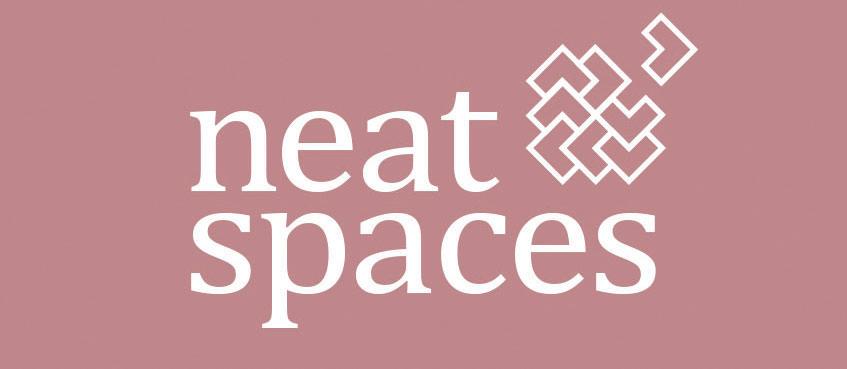
DECLUTTERING CONSULTANT
Thinking of downsizing? Want help sorting your possessions? Make life easier and more enjoyable Neat Spaces Canterbury offers experienced in-your-home decluttering and home-organising services
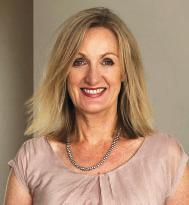
Contact Helen today
Ph: 021 512 427
E: helen@neatspaces.co.nz
FB: neatspacescanterbury www.neatspaces.co.nz
Reviewed by June Peka
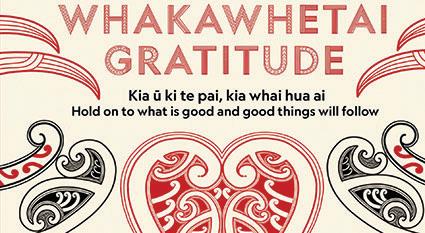
usually stable equilibrium for me to recognise the value of gratitude in the healing sense. Simple the wisdom may be, but often we just need to see and appreciate what we have in our lives, rather than what we
FRANCO DAL DIN
027 484 2739
03 355 6555
fdaldin@cowdy.co.nz
Licensed Agent REAA 2008
don’t, to begin to feel fortunate, lucky, blessed, healthy, well, relaxed, calm, happy – all positive emotions.
He oranga ngakau, he pikinga waiora – positive feelings in your heart bring positive health.



There is always something, however small, to be grateful for, and the new wisdom points to that feeling being magnified when it is thoughtfully noted down. Although at first, I found it hard to begin to write on these beautiful, guided pages, that’s what they’re for, and it became so much easier, even more special, when I bought a beautiful pen. Three, to be honest.
If you’re not used to writing every day, it’s OK to skip every now and then, but you will find the prompts, a dozen a day, most helpful. If there’s something weightier on your mind, and you need to write more, turn to the final 30 blank lined pages – nga murakehu, or “ramblings” and get it out to ponder over. This book, and another mentioned on page 13, will make the top of my gift list this year.
Keeping On eeping On 9 FEBRUARY 2024

Memories: Ian Gallaway
“The richest bank of all is our memory bank. For years we deposited experiences there. Now we can withdraw them. The interest accruing is our enjoyment.”
The cacophony of the modern sports commentator appalls me. How I would love to hear again the dulcet tones of Iain Gallaway.
Living in Southland and Otago in the 1970s, I became a fan of Iain’s cricket (and rugby) commentaries from Carisbrook, Dunedin. He spoke calmly and clearly. He was always fair in judgment of players and umpires. He spoke impeccable English. He analysed play with clarity. He made no negative remarks about players, as they were amateur in those days. He believed they did not deserve personal criticism.
A leading Dunedin lawyer, Iain made time to commentate, from club to international level, for love of sport. He represented Otago as
by Mike Crean
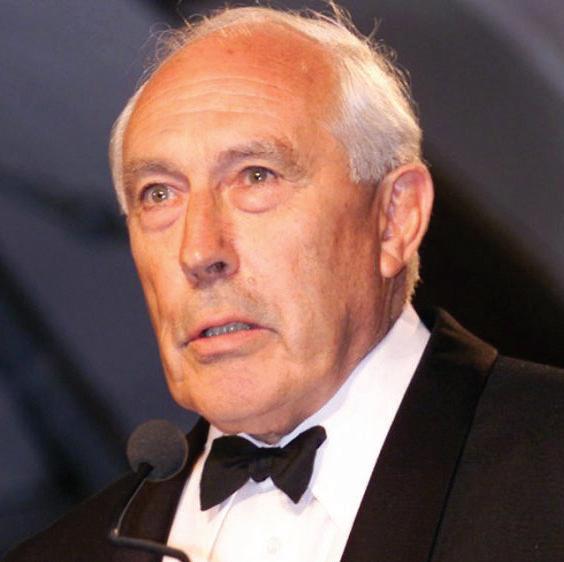
a wicketkeeper at first-class level. He once told me his ambition was to “keep” for the New Zealand cricket team. That hope was lost when World War II broke out.
Gentle and effective exercise
Used under feet and hands, the Aircycle exerciser is a simple way to relieve joint pain, increase circulation, reduce swollen ankles and cramps, help restless legs, strengthen muscles, and improve balance and mobility. It also aids in the prevention of blood clots when sitting for long periods.
Aircycle provides gentle exercise without weight-bearing or strenuous activity. It’s simple to use, soft on feet and hands and easily deflated for carrying in a pocket or purse. Use it from the comfort of your chair while sitting – reading, having coffee, watching TV or travelling.
A woman from Te Horo invented this simple device to help relieve her husband’s severe arthritic pain and swollen ankles. His arthritis carers were so impressed with the relief and increased joint mobility he experienced they asked her to make more for other sufferers.

Gay from Rotorua says, "Aircycle is better than the information says. The pain in my knees has gone and, although I use a walker, I don’t need it around the house anymore. I can move more freely and have much less pain in both my hands and feet. My feet are warmer too and now I don’t need bed socks which I’ve worn for years."
Sam from Oraki wrote, “I’ve suffered for years with sciatica. It’s gone completely when I use the Aircycle.”
Mrs Cooksley from Wellington advised, “I’m diabetic and had an ulcer on my leg which wouldn’t heal. After 7 weeks using my Aircycle it was gone! My Doctor is recommending it to other patients. The pumping motion is addictive and comforting. I use it while knitting.”
Includes lifetime warranty and listed with Medsafe. A wonderful gift for yourself or loved ones!

His era pre-dated most television sports coverage. How pleasant it was to hear his voice with the transistor sitting on a box beside you while you weeded the garden, or the big radio as you painted the skirting board inside. Of course, Iain was not the only commentator of those times. Canterbury folk may remember Scotsman Jim Reid describing play with his marked accent. More recently Brian Waddell was an excellent radio commentator.
More recently, ex-players such as Ian Smith, Jeremy Coney, John Morrison and John Parker, established a delightfully witty approach to television commentary.
This has been replaced with bellowing, shrieking and hollering, much of it based on cliches and verbal descriptions of happenings which have already appeared on screen. How often must we hear the observation: “It will run away for four”, as a whacked ball crosses the boundary? Iain would wince in his grave. The “mute” button on my remote-control is wearing out.
Iain grew up in the arid Maniototo district of Central Otago. He wrote his autobiography and gave it the title, “Not a Cloud in the Sky”. I cherish his sardonic smile as he explained this referred to the Maniototo, not to Dunedin. Iain died in 2021, aged 98.
Support to keep working
Do you, a Whanau member or a close friend have health and/or disability issues that are impacting on your ability to keep working? Do you have a disabled Whanau member who is struggling to find employment?
Vision Without Limits can assist people with health issues and/or disabilities, gain the support that they need to keep or commence working. That support could be identifying potential career and study options, acquiring work experience through voluntary work, support with commencing a new job or retaining your existing job. That could be as your health deteriorates or your disability-related issues increase. That assistance might relate to advocating for support, equipment, transport, colleague education or a job coach/support person.
years’ experience supporting disabled people to gain or retain employment or change career direction.
That decision around career change or giving up employment is often triggered by the revocation of a Drivers’ Licence. However, there are alternative ways of getting to and from work when you are unable to drive. Government funding is available for those alternative transport options.
Paul also works with disabled people to assess the work environment and the work tasks. Changes to the work environment or modifications to the work tasks can often allow people to continue working. It’s usually easier to keep working in your existing job with support than try and find and then commence a new job.
Paul also works with organisations and individuals to increase awareness around accessibility. That may relate to improved access to printed and digital information, buildings and facilities or education and training. A A
Paul Barclay has a Diploma in Career Counselling and is a Professional Member of the Career Development Association of New Zealand. Paul has more than 10
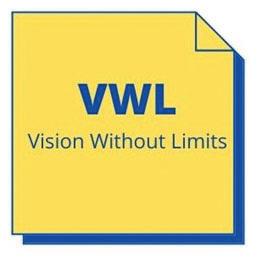
FEBRUARY 2024 Keeping On eeping On 10 Disability Employment Support Accessibility Awareness and Advocacy Supervision and Job Coaching For a free initial discussion please contact Paul Barclay at Vision Without Limits via any of the following methods: W: www.visionwithoutlimits.co.nz E: info@visionwithoutlimits.co.nz M: 028 461 1257 TF: 0800 VWL-321 (0800 895 321) Arthritis aid and circulation booster * Relieving arthritic and joint pain * Diabetic foot care * Cold hands & feet * Aiding prevention of DVT * Sciatica * Reducing swollen ankles * Stroke rehabilitation * Cramps & restless legs * Parkinsons & MS * Building muscle/preventing falls Helpful for: $44.90 incl. postage View and order at www.aircyle.co.nz or Diabetes Chch, 21 Carlyle Street or phone Sue in Levin on 0800 141415. Gentle exercise while watching TV or reading
Iain Gallaway

My Book Club recommends
Tomorrow & Tomorrow & Tomorrow
Reviewed by Annie Boardman
Being part of a book group exposes you to books you wouldn’t otherwise have come across or chosen, and this book is a wonderful example of that. For readers who are open to understanding and appreciating something of great importance to so many of the younger generation around the world, you will be richly rewarded by this novel about gaming.
This story starts back in 1987 when Sam and Sadie meet as children, bonding over computer games they play to while away time in a hospital where Sam is a patient and Sadie a visitor. Thus begins the strong connection to each other and gaming that draws them back together at university and into the gaming industry. Along the way, Marx, Sam’s friend, is gathered in and becomes the magic ingredient binding them all together and propelling them to commercial success.
Having never played a computer game, I was keen to learn about

this alien world, written by someone who is a gamer. It was easy to be drawn into Sadie, Sam and Marx’s lives and, as a consequence, the



world of computer gaming. Apart from characters that you become emotionally invested in, there is a satisfying intellectual component to the story with many references to art, literature and philosophy. Thankfully the author does not shy away from some of the well-known problems of the gaming industry: sexism and concerns around violence in games.
Many of the real games referenced in the story are mentioned in the Notes and Acknowledgements, but a chronological list would have been helpful, as would have been a short glossary for some of the gaming acronyms. This is not a failing of the story, however, rather a reflection of my own ignorance.
This is a novel ready to be discussed with the young people in your life – Gabrielle Zevin has given us a beautiful story and an exhilarating entrée into the world of video games.
Some comments from other BDS reviewers:
"I would never have taken this book from the library or purchased it because gaming is the central setting; that would have been my loss. It is so much more."
"I loved the skilled writing. The author is able to alter the tone of the narrative and believably describe young people's experiences."
"I enjoyed being immersed in the world of computer games, despite my own personal lack of interest; and my concerns about what they do to developing minds. I was able to see good in them, to my surprise."
About Annie
Annie belongs to four book groups, as it just isn’t enough being surrounded by books and readers all day in her jobs for Book Discussion Scheme and a large high school library. Fortunately, Annie is happy to read anything and everything that comes her way, but especially enjoys books that enlarge her world view.
A family run ready meal service in Christchurch
Kai 2 You is a family run Ready Meal business servicing the Christchurch area run by husband and wife team Adam and Jamie Pack.
Kai2You delivers Ready Made Meals fresh to your door twice a week, Tuesdays and Fridays, or you’re welcome to pick up your meals from our shop at 86 Harris Crescent Papanui, (our menus change weekly). All meals cost $14 and $8 for our puddings. We also sell delicious gourmet handmade pies.
Both Adam and Jamie are
passionate about delivering great nutritious food and service to people who are unable to cook, are time poor, in need of a little extra help in the kitchen, or just want a night off cooking.
The best way to order is via our web site www.kai2you.co.nz. Alternately you phone 0223891166 or email us at orders@kai2you.co.nz
Our shop is located at 86 Harris Crescent in Papanui with plenty of parking out the front. We look forward to hearing from you.
A

11 Keeping On eeping On FEBRUARY 2024 Experience the difference in supporting local – your specialist audiologist with ethical pricing Locally Owned & Independent. Gold Card Discounts 03 359 8557 www.bishopdalehearing.co.nz 7/337 Harewood Road (behind the Tavern Harewood) * Diagnostic Hearing Tests * Wax Removals * Hearing Device Fittings * Custom Ear Plugs
High temperatures and dehydration

Long spells of hot summer weather can take its toll on most of us, as it saps away the moisture from our bodies. For those of us who are ageing, or disabled hot weather can be deadly, especially if we are relying on others to give us drinks. In such weather we need to drink more water and more than the recommendation of 6-8 standard glasses of fluid a day.
Dehydration is a problem because our bodies are 60% water which is used for digestion, circulation, saliva, sweat to maintain our body temperature, and to transport nutrients and waste to and from our cells.
Our bodies are continuously losing moisture though urinating, our bowels, breathing and sweating. We may lose fluids because of:
• an underlying medical problem e.g. heart failure, kidney disease or an electrolyte imbalance
• diarrhoea
• vomiting
• large blood loss
• high fever
Dehydration can occur quickly in hot or humid temperatures as our body sweats to cool us down.

Here are some early signs of dehydration:
• tired and grumpy
• struggling to concentrate
• experiencing a dry mouth
• headachy
• unusually constipated
• unusually hungry
• dry skin
• cramp in the arms or legs
• urinating less and darker urine than normal
• dizziness
The first signs you may notice are feeling thirsty or hungry, however the best sign is urinating less frequently, with very dark urine. If you have any of these signs, the first simple solution is to drink more fluids. If this isn’t making things better seek medical help. Remember dehydration is life threatening. If you have any of the signs mentioned, drink more water than you would normally do.
If you need more advice on how to keep hydrated just contact us at Therapy Professionals our friendly dietitians can help.
Phone: (03) 3775280, Email: admin@tpl.nz
www.therapyprofessionals.co.nz
IS AGEING, DISABILITY, INJURY OR ILLNESS MAKING LIFE DIFFICULT?
Job interview with a cat
by Brian Bilston

Tell me, what is it about this position that interests you?
The warmth, perhaps? The security?
Or the power you must feel by rendering me useless?
Feel free to expand if you wish.
I see you have had experience of similar positions.
Can you talk about a time when you got someone’s tongue? Or were set amongst the pigeons?
Have you ever found yourself in a bag only then to be let out of it?
Tell me, how would you feel if you had to walk on hot bricks?
What about a tin roof of similar temperature?
With reference to any of your past lives, has curiosity ever killed you?
Finally, where do you see yourself in five years?
In the same position? Or higher up to catch the sunlight?
Or would you like to be where I am now?
Oh, it appears you already are.
For
Telephone: (03) 377 5280
(03) 377 5281
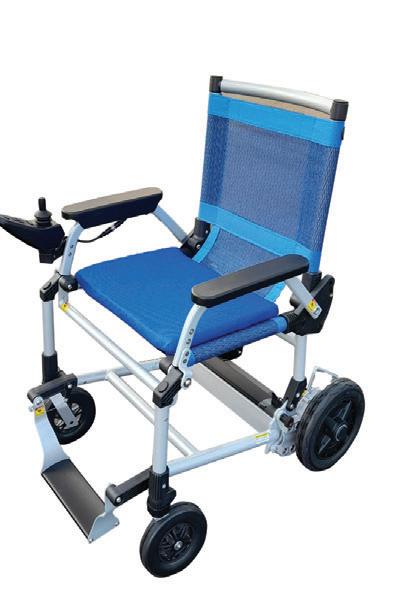


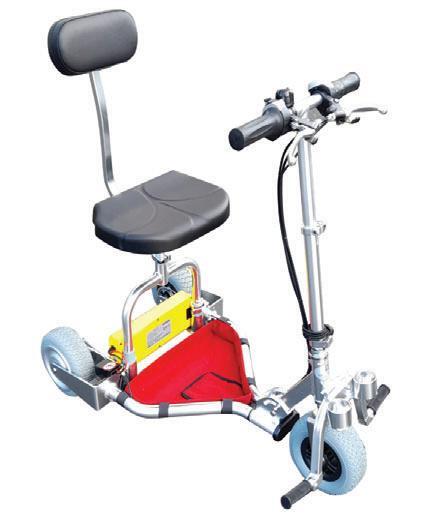
FEBRUARY 2024 Keeping On eeping On 12 Come and View NZ’s Best Range of Mobility Products at More Mobility! 113 Blenheim Rd | 0800-666-222 | www.moremobility.co.nz | christchurch@moremobility.co.nz Open 9-5pm Monday to Friday & Saturday 9am-2pm OVER 1000 PRODUCTS INSTORE & EXPERIENCED KNOWLEDGEABLE TEAM TO HELP KEEP YOU INDEPENDENT. Visit our showroom or call us for a FREE Home Demostration. Ph: 0800 666 2222 Therapy Professionals Ltd’s physio, speech language, music and occupational therapists and dietitians can make life easier. We can help. We come to you.
more information contact:
admin@tpl.nz www.therapyprofessionals.co.nz
Fax:
Never too old to make new friends
by June Peka
To paraphrase that old bromide, I don’t know much about music, but I know what I like. Turns out to be the same with musicians; I met the very noted Mark Walton in January, and it was instant like. He’d said in our electronic communications that he knew we’d get on like a house on fire, and we did. We linked arms as we walked up his driveway and waved hubby goodbye for an hour, as though we’d done it a hundred times before.
I’d dropped in to talk to this new writer kid-on-the block - the one who’s getting us all misty-eyed with his words about the good old days, in The Press. Sunlight beams into every large open window and door of the freshly redecorated beige summerhill unit from the seventies. There’s lots more beige inside too. It’s positioned perfectly to sip an iced water in the available breeze on this hottest day of the year so far, and a stone’s throw from the shopping centre and a short taxi ride to the airport. It’s a dozen suburbs and fifty years away from “the brightest yellow house at the not-so-posh end of Worcester Street,” which thanks to his ex-art teacher mum, was also a visual symphony on the inside.
Mark’s back in Christchurch for a few days to catch up with as many people as he can, and to farewell a dear friend from a Queenstown home, with a piece of music he composed and which meant a lot to her, played with love. “Love” is a word Mark isn’t shy to use. It’s the same with “beauty”, both words which seem to come naturally to this chap with a wonderfully exaggerated sense of joy and gratitude.
“I’m not much of a church person, but I adore the beauty of churches. I could sit all day in the calmness of a chapel, with ordinary people, listening to their extraordinary stories, with some beautiful music playing in the background.”
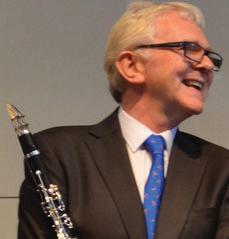

Writers are nosey by nature. They have the cheek of Old Nick. So I’d had no qualms getting in touch with Mark after seeing the first of his nostalgiainducing Press stories. Now I’m a bit embarrassed. I should’ve done some homework. Not only is he far from an overnight sensation in the world of the written word (his book is a must for all Christchurchians) but he turns out to be one our most famous musical sons. He’s been making notes around the world for more than a half century, and he’s only 66.
Born with the incurable eye condition nystagmus, Mark at the same time was doled out massive doses of determination and application. Totally disliking music at school, he had to be dragged kicking and screaming to his first recorder lesson at the Christchurch School Of Music, but when he returned home he was “hooked”.
“Music became my whole life. Until then I hadn’t been much good at school and had only shown a glimmer of talent for painting colourful pictures and giving poetry recitations. There was no more trying to work out what was on the blackboard at the front (of the music classroom) because now I could perch my new book on the end of my nose. For the first time I could read music.”
The family, last in that long street to own a car or a television (says Mark)
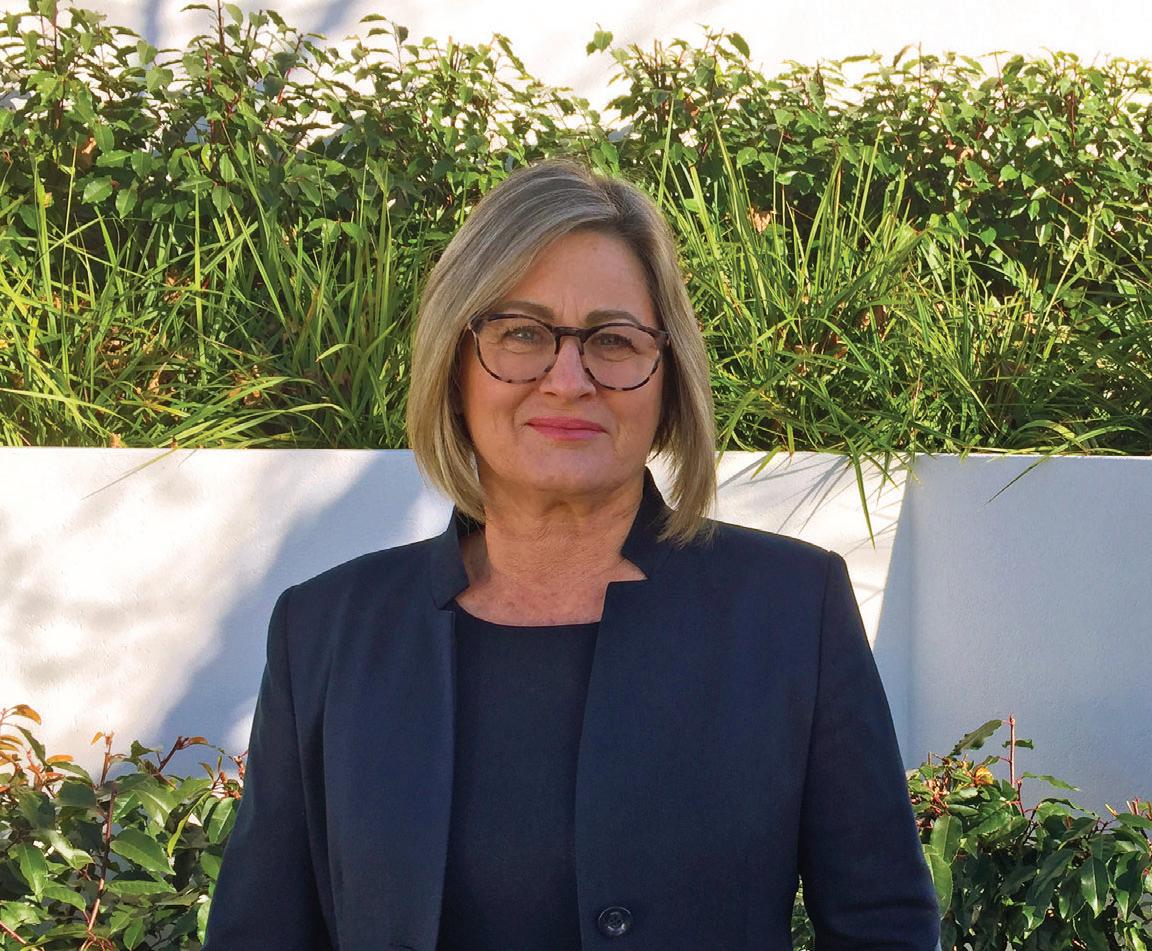
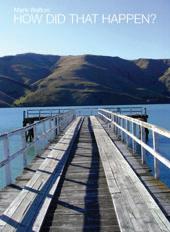
didn’t get to concerts at that stage, so his first memories of live music are of the annual Santa Parades. Itching to ditch the recorder he dreamed of playing the trumpet in a big brass band. And although he still loves the trumpet, it’s the clarinet which makes his heart beat faster.
As the book blurb says - “Playing the clarinet became his passport to an unlikely and fascinating life that has taken him from the quiet life of Christchurch to New York, South Africa and the Australian outback.” All this via extreme hours of practice, and tuition from very big names in the world of music.
Mark doesn’t blow his own trumpet/ clarinet for me. Instead he gives me a copy of ‘How Did That Happen?’ The very well-written 2010 precis of his life, put together to raise funds for the Christchurch School of Music Support Trust, so that we can just carry on name-dropping and nattering about life in general and our mutual love of words. I’ve made him a black and white magpie mobile which goes with the decor and which he says he likes. Quietly, I think I got the better deal.
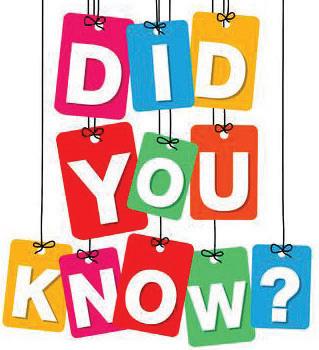

Awanui Labs (Formerly Southern Community Laboratories) is the place most of us go to get routine blood and pathology tests required by our medical practitioner.
There are numerous collection points around Christchurch and throughout Canterbury. Most blood tests do not require an appointment, but it is highly recommended that you do make one to avoid waiting.
Appointments can be made online through the Awanui Labs website, or by phoning 03 359 0900.
Your health care professional should inform you of any specific requirements for your test, for example, if you need to fast prior to the test. They should also either send through your paperwork or give a copy to you.
Doing these simple things will streamline your blood test experience.
Keeping On eeping On 13 FEBRUARY 2024
Mark Walton
The Canterbury West Coast Welfare Guardians Trust needs volunteers
The Canterbury West Coast Welfare Guardians Trust is a charitable trust established to provide, recruit, approve and train suitable volunteers to apply to be Court-appointed Welfare Guardians for people who are unable to make, or communicate, decisions for themselves. Once appointed the Trust provides on-going support for the volunteers.
The Trust consists of a Board which brings various fields of expertise and experience to ensure the Trust’s aims are met. The current Trustees have expertise in social work, aged care representation, family court processes and health and disability issues.
Approved volunteers are needed when the subject person lacks any suitable local relatives willing to apply to become their Welfare Guardian.
Once appointed by the Family Court the Welfare Guardian is the only person legally able to make decisions about the day-to-day care and welfare of their Subject Person. These may include decisions about non-urgent medical treatments, accommodation and any day-today matters that the person would normally make for themselves but, who the Court has ruled, lacks the capacity to do so.
(N.B. Court-appointed Welfare Guardians have NO right to make any decisions about the property and assets of the subject person. These decisions can only be made by a Court appointed Property Manager. Volunteer Welfare Guardians are only appointed as Property Managers in exceptional circumstances as this work is invariably undertaken by professional business organisations
such as the Public Trust).
What does the Trust do?
The Trust recruits, approves, trains and supports suitable volunteer Welfare Guardians.
The Trust Co-ordinator receives requests for volunteers from a range of people including lawyers, rest home managers and family members who live outside the local area or are unable/unwilling to act as a Welfare Guardian themselves. The Coordinator matches the needs of the subject person to a suitable volunteer and supports the volunteer to apply to the Court for an Order appointing them the Welfare Guardian.
How do I apply to become a volunteer Welfare Guardian?
Complete an Application Form available from www. welfareguardians.nz/canterbury and return to Canterbury West Coast

Welfare Guardians Trust, 1 Rimu St, Riccarton, Christchurch 8440, or email the application cwcwgt@gmail. com. You will be required to consent to a Police check form, and to sign a Confidentiality Agreement.
Once your referees have been contacted you will be invited to an interview and subsequently advised if you have been approved.
What happens next?
When you have been approved the Trust will contact you with details of the next training sessions.
When you have completed the training your name will be added to the Trust’s list of available volunteer Welfare Guardians.
You will be contacted by the Coordinator when an appropriate request has been made to the Trust.
Email: cwcwgt@gmail.com
Phone: 02041893045.
Help with technology at Age Concern Canterbury

Age Concern Canterbury is running a weekly session to help older people with technology issues. This one-on-one session is designed to assist with specific problems on phones, tablets, or laptops.
Each Thursday morning a knowledgeable staff member will be available to give you half an hour of their time to help you clean out your emails, file your photos, video call your grandchildren... or whatever else you need to help you in this increasingly digital world.
The staff at Age Concern Canterbury have found that oneon-one help is more beneficial as we can address individual issues but if there is a common thread among the queries we would consider running a specific class on that topic.
Due to the popularity of these sessions, we now ask that you make an appointment time by contacting us on 03-366 0903 or email staff at team@ ageconcerncan.org.nz






Keeping On eeping On FEBRUARY 2024 14 Est. 1979 Arthur’s Roof & Property Services Ltd. Email: APISL2008@slingshot.co.nz POSTAL ADDRESS: PO BOX 16-463, Hornby, Christchurch. Ph: (03) 347-2635, 027 584 7980 or Anneke 027 349 4014 www.arthursroofandproperty.co.nz Family & Canterbury Owned & Operated Moss Removal, Moss Proofing & Silicone Seal Treatments Spider/Fly/Pest Controls, Snow Block & Bird Proofing Roof Restoration Colourcoating & Rechipping - for all roof types Roof & Spouting Repairs, Spouting Clean, EnviroWash/Waterblast ROOF & PROPERTY SERVICES PH 347-2635 or 027 584 7980 Need help with anything else? Call us to enquire. Senior Citizen Discount. NEED A PLUMBER? www.clyne-bennie.co.nz 0800 37 47 37 Our team can look after drainage, electrical and heating requirements. Call our friendly team today BLOCKED DRAINS?? WATERBLASTING?? Competitive Prices CANTERBURY WATERBLAST LTD ANYTIME - (03) 365-7960 Book your Trade size ad (40mm x 65mm, cost $51.00 + GST) in our May 2024 Keeping On Contact Anna-Marie on 331 7804. TRADES DIRECTORY Volunteers Needed Canterbury West Coast Welfare Guardians Trust The Canterbury West Coast Welfare Guardians Trust is seeking suitable volunteers to apply to be Courtappointed Welfare Guardians for people who are unable to make, or communicate, decisions for themselves. Training and on-going support are provided. For further information please contact cwcwgt@gmail.com or phone 02041893045.
Community Law seminars at Age Concern Canterbury
Age Concern Canterbury will be hosting a series of law seminars over the next few months. The seminars will be delivered by Catherine Thwaites a legal educator at Community Law Canterbury. Catherine is part of the team that is dedicated to empowering the community through legal education.
The team focuses on educating the community on a diverse range of topics, spanning from employment, family, and housing issues to criminal matters, human rights, and Māori land.
Catherine is currently studying for a Law and Health Science Degree, which is fueled by her passion for health law. Her goal is to contribute to improving healthcare access for everyone as a lawyer within the healthcare system.
Community Law offers free legal information and initial advice across a wide spectrum of issues.
Age Concern Canterbury is pleased to be able to support Community Law in making legal insights accessible to everyone, and so contributing to a
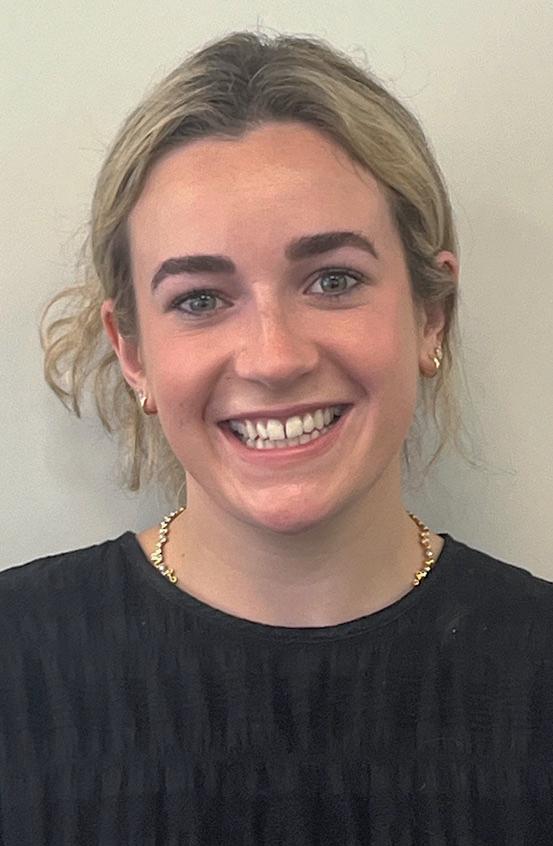
Catherine Twaites, Legal Educator, Community Law
better informed.
If you wish to attend one of the seminars listed below, please register by phoning Age Concern Canterbury 03 3660903, or email team@ageconcerncan.org.nz.
Community Law Seminars
Thursday, 28th March 2024
from 11.00am to 12.00 noon
Advance Care Planning
Wednesday, 24th April from 1.00pm to 2.00pm
Health and Disability Rights “How to make a complaint”
Thursday, 23rd May 2024
from 11.00am to 12.00 noon
Retirement Village Law changes
Thursday, 27th June 2024
from 11.00am to 12.00 noon
Tenancy Laws for Older Tenants
Thursday, 25th July 2024 from 11.00am to 12.00 noon
Enduring Powers of Attorney
Register by phoning Age Concern Canterbury on 03 3660903 or email team@ageconcerncan.org.nz
Seminars to be held at Age Concern Canterbury, 24 Main North Road, Papanui. Christchurch 8053.

Arthritis pain relief that works in minutes
Florentine Gold All Natural Harmony Body and Joint Rub (topical lotion) is an amazing product with so many uses and benefits. You can purchase this online by visiting our website www.florentinegold.co.nz or email us at info@florentinegold.co.nz
* Made with all natural mineral crystal salts and essential oils.
* Excellent for sensitive skin - no harmful additives.
* Contains Omega 3 and Omega 6.
* Easy absorption, non greasy, biodegradable, ozone friendly.
* Vegan and cruelty free certified.
The All Natural Harmony Body and Joint Rub is wonderful for all types of pain relief including peripheral neuropathy sensory ataxia, gout, neck and shoulder pain and stiffness, headaches, migraines, pulled and strained muscles and tennis elbow and much much more. Also gives relief to some skin conditions including acne, eczema and psoriasis. It is excellent for sore throats and toothache (for external use only), speedy recovery from migraine headaches, for the relief of sunburn and takes the itch from mosquito bites.
“With a dose of scepticism I tried the Body and Joint Rub for
my damaged cervical spine and carpal tunnel and joint problems. It freed up and alleviated the pain and increased mobility almost immediately. With Allodynia, a nerve condition, and head injury symptoms, I then tried it on my scalp and to my joy and surprise it stopped the nerve over stimulation. I am now using it daily. Indebted to Florentine Gold for providing such a great product.” John S. Canterbury. 1st July 2022
IMPORTANT NOTICE
Due to ongoing manufacturing, freight and courier price increases we can no longer absorb these costs. As from the 1st April 2024 there will be a price increase in our Florentine Gold products. You can be assured the quality of the products and the service will remain at the same high standard. The 200ml Body & Joint Rub will now be $48.50 the 100ml will remain the same $36.50. Courier postage is included in these prices however, the cost for rural delivery will increase to $7.00 (which must be paid separately into our bank account as our website does not allow for this cost. Thank you for your ongoing support FGNZ Ltd.
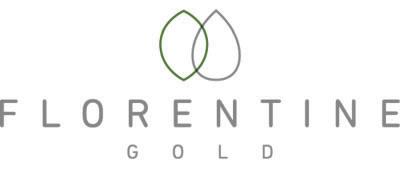
All Natural Harmony Body & Joint Rub
Great for all manner of joint and muscle stiffness, sprains and strains and dry flaky skin.
EXCELLENT FOR SENSITIVE SKIN
Phone: 027 517 2347
Email: info@florentinegold.co.nz www.florentinegold.co.nz
A
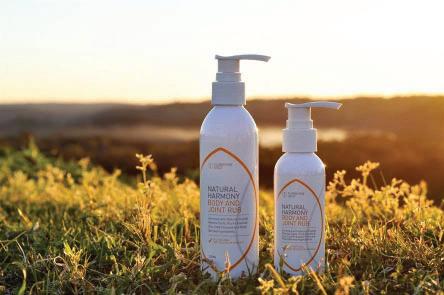
Natural Harmony Body & Joint Rub is $48.50 for 200ml and $36.50 for 100ml and includes delivery. However, for rural deliveries the cost is $7.00 which must be paid directly into our bank account. You can purchase by visiting our website www.florentinegold.co.nz, by emailing us at info@florentinegold.co.nz or by phoning us on 0275172347.
“OMG This stuff is MAGIC! I have been suffering tremendous lower back pain for the last few days (nerve pinch I think?) In tears with the pain, can’t sleep, hurts to walk, hurts to sit. My husband handed me his bottle of Florentine Gold & I am a different person. I simply can’t believe how this stuff has turned my pain away by 99%. I can’t use the normal anti inflammatory drugs due to medication I
Keeping On eeping On 15 FEBRUARY 2024
All Natural Harmony Body & Joint Rub would make a wonderful present for family and friends.
TESTIMONIAL The
am on. Florentine Gold you are a life saver. I will be ordering a second bottle tomorrow! Diane Stockley Te Aroha on Jan 26, 2024

There’s a maudlin thing doing the rounds on Facebook about being forgotten when you die. My mum believed that. She’d be surprised by how often she’s talked to and about, twenty years on, and her parents much longer.
Serious remembering is more than those fleeting images which come unbidden. It takes time, a luxury for working folk but something we have more of in retirement. By way of my journal I’ve made it a regular practice since the turn of the century – a bit like exercising or meditation, yoga or praying – to remember meaningfully. It involves gratitude and mindfulness both of which I find helpful forms of brain gym.
I’ve been talked into having a bash at my own Life Story. Helping others with theirs, through Dementia Canterbury, was a doddle, but this is hard going. It won’t be offered for publication, because anyone other than whanau would find it an excruciatingly boring catalogue of minutiae about balloons falling from the back of a truck, and which aunty farted the loudest. (That was Edna, if you must know). I’ve written about what slept in a real bearskin in a tree in the backyard, and how I could spell aquarium before I went to school and what happened when my older brothers took me to see Mutiny On The Bounty when I was seven. That sort of thing. And I’m only up to
Life Stories
by June Peka

my eighth year. But it has consumed me! I now understand what my story-tellers meant when they said they couldn’t sleep at night between our sessions, for thinking about these dredged up memories. My lovely story-tellers often couldn’t recall what they did yesterday, or even had for breakfast today, but they remembered with such clarity, seeing kittens born eighty years ago, and the day they started school.
I lie wide-eyed in the dark, with a pen in my hand, The clearest memories seem to come around 3 am, when one doesn’t dare switch the light on. There are curses when
daylight reveals the clear scratchings of a dry ball-point or 10 sentences in the one place.
Through active remembering I know that my love of words came from my crossword-loving mother and father. I can hear as though yesterday, Mum talking about those pesky little French “e” words, ennui, ecru, etui, and elan which often pop up in crosswords. Between us we sorted out why all words which begin with “aqua” have something to do with water. Omni was another of those I never forgot, and dis. I remember her telling me that the silly slippery slithery superstitious snake was not only sibilant, but alliterative. When I
helped dad with his crosswords and letters to Nana, I was spellbound by his exquisite lettering and numbers with ornate fiddly bits, for which he’d received an award from Boulcott School in 1925.
So it’s only now I truly understand the absolute excitement of my story tellers when they remembered precious details they’d almost lost. I wish my parents, and grandparents had done this exciting thing. As Fiona Brooker says on her website (see below) “wouldn’t it be great to have a photo of your grandparent’s kitchen?” Well, have you made sure there is a photo of your kitchen for your grandchildren?
As a challenge to myself, and in memory of great uncle Harry who I never met, I’m writing him back into the family too. A bachelor, Harry Smith has no descendants to recall his quirks and foibles. My brother and I and an older cousin are the only people alive who know he existed, and have second-hand knowledge. We have marvellous photos of a handsome swarthy chap with a moustache which earned him the nickname Handlebar Harry. We know he never owned a car, but biked everywhere, taking remarkable photographs on his journeys. And he constructed unique concrete plant pots which have stood the test of time. GUHH will live on because this knowledge is written into my life story.
With Aroha, gifting your stories to Mokopuna
Don’t we regret that we didn’t listen to or record our grandparents’ and parents’ stories? Mike Paterson in a wonderful book With Love Gifting your stories to Grandchildren (Tandem Press, 1995) reminds us that we too are ancestors of generations to come and by writing our stories we will enable future generations to know more about who they are, where they have come from and what’s gone before. I am in the process of setting up a course, following the steps recommended by Mike, possibly delivered from the Papanui Village Centre, as part of their Tuesday creative nest. He suggests steps we can take to ensure that our stories last for the next 500 years.
My background in teaching history, managing, writing, and editing for The Press Newspapers in Education department (1986-1999) gives me essential skills for this proposed project.
Turangawaewae: Who do you think you are? was a rewarding
by Defyd Williams
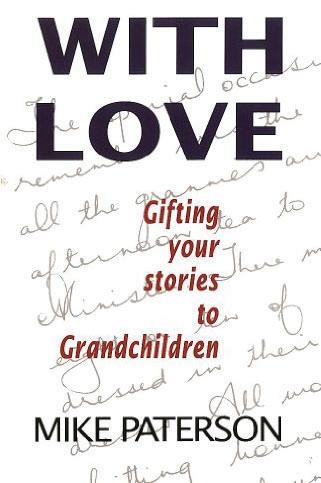
and successful NCEA research and presentation assessment I facilitated as learning leader of social sciences and history at St Paul's Collegiate School, Hamilton (2005-2019). Students, after being taught research
skills, would carry out an inquiry of an event or place important to their family. This could be recent or distant history. I taught a descendent of the famous Waikato warrior Rewi Maniapoto and he explained his whakapapa/ancestry. There were many memorable assignments related to events at home and abroad from two World Wars, the 1981 Springbok Tour, the introduction of Speedway to NZ, Kiwifruit farming, and pioneering families.
During Covid lockdown I wrote my memoirs His Story, where I took two life defining years from each decade of my life and each chapter had three headings: Te Ao (to examine events happening in the world), NZ (the nation) and I (in my personal life). I submitted the introduction and first chapters to Canterbury University Press. They encouraged me to keep writing, but after receiving 40,000 words, concluded that this didn't fit their publishing profile, yet would be "cherished by my children and
grandchildren." Perhaps publishing for family is all that is needed in the end.
This Christmas, (2023) our youngest daughter and son gave me a great present to tell my stories. It's an American programme called My Life in a Book. Each Tuesday (Monday USA) I receive a question to answer. To date I have been asked: Is there something unusual or special about the story of your birth? What is the first thing you remember? Which is the first birthday you remember? How did your family celebrate birthdays? The programme formats the stories into chapters and photographs can be added. At the end of the year the book is published, and copies can be made for family members.
If you are interested in joining the proposed course and support group, contact me defydjoan@xtra. co.nz or phone 027-3894-179. The expectation would be that all group members publish their stories in December.
Keeping On eeping On FEBRUARY 2024 16
Great Uncle Harry (aka Handlebar Harry).
There are many ways Canterbury people can record their own, and family memories. Classes to update and expand your skills are available at minimal cost, via Adult Education at high schools and community centres. Private providers offer many options through a wide price range.
From a single class decades ago, at Okeover, on the Canterbury University campus Grant HindinMiller went on to help many hundreds of people in a series of sessions, to best record their memories. He now offers a smaller range of classes often from the Fendalton Library. Grant writes ... “The helpful thing about writing memories is that everything you need is within you. Take a pen, a notebook, or grab a laptop, and start writing. It is proven that writing memories is good for your health-not just emotionally, spiritually or intellectually - but physically. The fact is that when people write life stories it boosts their immune system - the amazing thing is that it doesn’t matter if the memories are positive or negative; your immune system is enhanced. Writing memories was the most successful way to heal shellshocked soldiers from the trenches.
Each of us has a prodigious memory (whether we realise it or not) and once we begin prospecting in the hills of our past years (even early years) then gold turns up to be found. Even if you think ‘oh they’re just old pickings’ - once you sort and toss a few tailings around you can find pounamu, pearls, and buried nuggets that you had long forgotten.
Prospecting for memories is a rich experience. You can take a scene from your childhood and describe it as best you can, then you can look at it and reassess it. You can consider who else was in that scene and try to understand what was happening for that other person at that time. What were they going through? You can gain new insights to what took place. Writing memories, whether large or small, whether mundane or dramatic, contributes to social history. Others will identify with what you write. I believe that we are not islands, separate from one another, but rather we are like one soul in many bodies; and whenever someone tells the truth it helps someone else to not feel alone.
I also agree with the great writing tutor, Brenda Ueland, who said: “Everyone is talented, original, and has something important to say. Everyone.” Contact Grant granthindinmiller@gmail.com
Other Life Story options:
Anna Wallace, certified instructor of the Dr James Birren method of Guided Autobiographies offers 8-10 week sessions of two hours, in a group setting of like-minded people. Using themes, recollection exercises, creative writing tips and feedback, participants will write around 1000 words each week at home, which they will read to their small receptive group. Anna says “we all have stories to tell and you’re the best person to narrate your unique journey. Some people have started an autobiography or memoir, some folks love reminiscing about
Memories are made of this
by Colin Smith
I’m working through the challenge of writing a memoir. It’s like heating a cauldron, in which the hotter it gets, the more “stuff” floats to the surface. There’s 75 years worth of me bubbling in that big pot, and the real challenge is, how brave do I want to be when choosing which to ladle out and which to let boil dry? It’s emotional, as I do want to include the all, given the all is the skinny white geezer I am today.
Setting out on this journey is challenging because it’s raised a lot of thorny questions about identity and belonging. Maternally we go back to the Irish Celts and paternally we’re Belgian Huguenots kicked out by a Catholic king. For me, from a turangawaewae stand point, that leaves me feeling flimsy and ungrounded in today’s AotearoaNew Zealand. I have a powerful sense of kinship with indigenous cultures, uprooted and lost from their connection to land and sometimes language. Twice I’ve had to leave the land I was attached to, when I thought I was there for the long haul.
At 75 I feel restless and homeless.
“A story of place can be a story of sadness, everything changes. A story of belonging will always be a story of loss.” I like this Japanese way of Kintsugi, the way of an acceptance that things will never stay the same but they can be made over into something else with a different kind of beauty and value. I’ve been lucky to meet family in recent years, who’ve filled me in on my father’s whakapapa, which has gone some way towards making over, and mending me.
And recently I spent some days in Kaikoura with my late mother’s two surviving sisters. The ancient aunts shared their stories over a meal at the Pier Hotel where Mum had worked and met my father who was visiting with the Petone rugby club in 1944. They married in the cloak room of the church as Dad wasn’t a Catholic. Our branch of the family began then and much water has gone under the bridge. It’s going to take some harnessing, but I’m up for the challenge. I think it will be good for me.
the past with others, some of us are going through a time of transition/ reflection, while others are seeking meaning, connection or an improved sense of self-worth. All can benefit from guided autobiography.” Contact Anna at awo199@hotmail.com.
Nurse Maude provides a biography service for people in Canterbury with a life limiting illness who would like to have their life story recorded. A life story can help to deepen a person’s understanding of themselves and the lives they have lived. It is important to ensure the stories appear in the person’s own words and their unique tone of voice. The biography service is free of charge and is provided by trained Volunteer Biographers. Confidentiality is assured and written consent is obtained at the initial meeting. The person can record memories from their life or may wish to write letters to specific people in their family or whānau. Photos can be included, and the biography can be as short or as long as the person would like it to be. The Volunteer Biographer makes home visits or can meet with the person at the Hospice in Mansfield Avenue, Merivale. The interview sessions are usually for no longer than an hour. The final approved biography will be presented as a bound copy.
Christchurch author and editor, Jo Bailey believes that every human being has an amazing story to tell.
“Recording our personal and family stories is the ultimate gift for future
generations. Imagine how much they would love to read about who we were, what we experienced, and what life was like during our time in the world? Writing our stories can also be a cathartic experience, which helps us to make sense of the things we have experienced in our lives,” she says. Since 2018, Jo has taught her Writing Life Stories Your Way workshop to countless groups, sharing comprehensive course notes, practical tips, fun exercises, and a personalised Road Map, to guide participants towards crafting their own unique projects, in the way that works best for them. She says writing life or family stories doesn’t have to be daunting. “I compare writing to baking a cake. Once you know the steps and have the critical ingredients in place, chances are you will produce something great.” Learn more about Jo and her Writing Life Stories workshops at www.jobailey. com
Joanne Cormack and her daughter, Jasmin Bristow, offer their Magic Moments template for recording your life story. Starting with a one-hour interview, your words will become a fully finished attractive book covering exactly what you want, along with chosen photographs and pearls of wisdom. These books have enduring value for future generations, Joanne says. To learn more about creating your legacy, whether book or video, see the website www. lifetimelegacy.co.nz.
Helping to trace family history to share
Fiona Brooker, Chief Memory
O
fficer and Genealogist of her own website, whose interest/addiction was spurred by a school project at a very early age, offers a free 15 minute discussion to help ascertain your history project is tailor-made for you. Passionate about helping trace family history to share, she can add extra dimension through her interest in the latest DNA developments, and
digital scrap-booking. Living locally, she has research contacts all around the world, as well as an extensive online shop to help you keep your records in logical, findable order. Her aim is to help as much as possible to preserve the present for the future.
Fiona's website is www. memoriesintime.co.nz . Write to PO Box 37-258, Halswell 8245, Christchurch.




Keeping On eeping On 17 FEBRUARY 2024
Wonderful donation from The Purl Girls
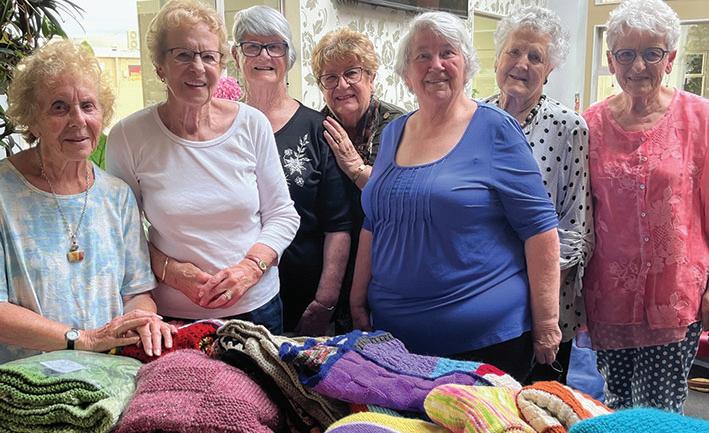
to be the recipient of a wonderful donation of blankets from the Purl Girls. For many years this group of friends have been meeting weekly at a local café to share their love of knitting and crochet. Christchurch charities benefit from their creations and Age Concern Canterbury considers itself to be fortunate to be one of these beneficiaries. With winter just around the corner the blankets will be handed on to some of our clients.
Over 40 years in the antique business
Steve Purcell is a licensed antiques dealer trading as Antiques International Limited, with over 40 years experience in the business. Steve started frequenting antique shops and restoring antique furniture when he was 15 and developed a passion for Kauri furniture in particular. After “doing up” a number of pieces it soon became apparent that some would have to be sold to make room for more projects.
Developing associations with a number of dealers, it was a natural progression into general antiques, art and jewellery. In the ‘80s the hobby became a business selling items at antique-fairs, on behalf in established shops and converting an old Bedford bus into a mobile antiques shop.
In the ‘90s the first official shop “Circa 1900” was formed with a partner in Merivale and a second shop in Riccarton called “Finders”. With the dawn of the new millenium internet communication was now a well established medium for selling,
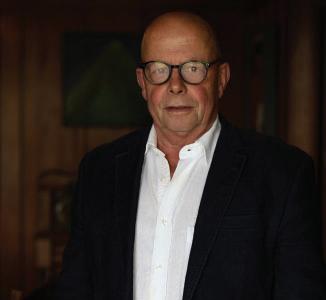

opening the door to a world-wide customer base. “Circa 1900” was closed and the company Antiques International was formed.

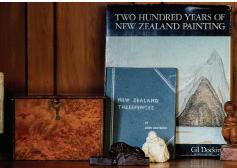
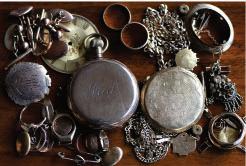
Fendalton Post Centre
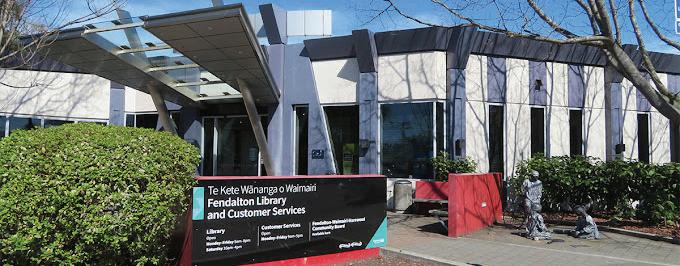
The Fendalton Post Centre, located within the Fendalton Library and Service Centre, will be upgraded to a Post Centre Plus which means that this Post Centre will now offer Bill Paying services. These services will be available from 15th February 2024.
Bill payment includes services such as:
• Vehicle registrations, change of ownership, etc (NZTA)
• Paying power, phone bills, etc
• Paying council rates
• Applying for a new IRD number

The Fendalton Post Centre, Fendalton Library and Service Centre, 4 Jeffreys Road, Fendalton, Christchurch 8052.
Open: 9.00am to 5.00pm, Monday to Friday.
The Shoe People
Anna and Mark have over 40 years podiatry experience between them and are excited to announce their new Mobile shoe service. After frequently seeing clients from rest-homes and retirement villages who struggle to find comfortable shoes, they decided to act on this need. Known as The Shoe People, they are booked out for the next couple of months, however if you would like them to visit your resthome or village, speak with your own activities coordinator or manager and ask them to arrange a pop up day with The Shoe People.
'We normally set up some tables and stands in a club room or lounge and offer residents the chance to look at the footwear and try on something that appeals. Although we aren't there to offer any Podiatry services, our knowledge is helpful when fitting shoes, especially if bunions or other common conditions are present. 'Most villages host us for a couple of
hours, however special orders can be made on the day and any exchanges or returns are dealt by us personally' states Anna.
Specially selected footwear options covers width, depth, velcro, diabetic or arthritic friendly and slippers. The service is no rush, no pushy sales or gimmicks.
Shoes and accessories can be paid for on the day by EFTPOS or cash. The service is aimed at resthomes and villages from Ashburton, Christchurch, Nelson and Blenheim. 'We can't come to individuals private homes as it isn't viable with the amount of stock we need to carry' mentions Mark. In the future the service could be offered to expos, coffee mornings or group meetings. There is also a small selection of shoes available at the clinic on 390 Memorial avenue, Burnside.
The Shoe People – 03 669 2506 or mark@solecarepodiatry.co.nz.
A

FEBRUARY 2024 Keeping On eeping On 18 STEVE PURCELL ANTIQUES BUYING - SELLING - VALUATIONS - APPRAISALS - ESTATE ADVICE BUYING NOW Old jewellery and scrap gold * Old coins & banknotes * Old New Zealand items * Paintings and old prints * Old silver and pewter * Medals & badges * Collectables * Old China porcelain & pottery * Old watches & clocks If you have any of the above items you wish to sell please contact today for a consultation or to arrange an appointment. 0800 4 BUYER - 0274 327 514 - 03 351 9139 stevepurcellantiques@gmail.com WWW.STEVEPURCELLANTIQUES.COM
Steve Purcell, licensed antique dealer
A
Age Concern Canterbury is thrilled once again
Returning South to Re-tyre
A set of circumstances saw my wife and I return to the South Island to retire in 2020, or as a friend reminds me: to Re-tyre. This has involved some re-treading as, hopefully, this article will uncover. Our original intention was to keep working and eventually move permanently to Waihi Beach from working in Hamilton. Although, we are warned never to move for children because they are likely to move again, when our youngest daughter, husband, and three pre-school children returned from Australia to Christchurch we followed. People who make these big changes for family need to ask themselves several questions.
Who benefits? The Rotary 4-way test poses questions useful for everyday decisions: Is it the truth? Is it fair to all concerned? Will it build goodwill and better friendships? Will it be beneficial to all concerned? We loved being beside the sea at Waihi Beach in the beautiful Bay of Plenty, and through our careers in teaching and nursing made lots of friends in Waikato. Still, we had kept strong contacts with family and friends in Christchurch. We would benefit from being close to my mother, our daughters, and grandchildren. We both have sisters, and brothers living in or near the city, so if some of the family decided to move, we would still have a strong whanau support group.
What will you miss most? Family these days are spread far and wide around the Globe. Our son, wife and two grandsons live in Auckland. Waihi Beach and Auckland are equidistant from Hamilton. It’s 90 minutes travel time from Hamilton to Auckland and from Hamilton to Waihi Beach.
by Defyd Williams

Hamilton is a great hub for exploring the Central North Island. Our home at the beach was a great place for family occasions, such as birthdays and Christmas for 20 plus whanau, with a carpeted garage and lots of space for tents. Recreational pursuits such as fishing from our son’s boat are fun activities for everyone. Returning to Christchurch, after 15 years up North, we are reintroduced to the coldness of winter nights, the southerly wind and the beastly easterly, which spoils the summer months.
Where will we live? Ideally near family in Christchurch, which now includes four grandchildren and two grand-dogs. This is a special stage of our lives. Grandchildren are a blessing and a privilege, to share moments in their development from learning to walk, speak, graduating from pre-school, and starting primary school are moments to be cherished. Reading them books and watching them play sport are special privileges. Helping them learn all sorts of things from catching a ball to riding a bike and taking them places is never a burden. Financing rest-home care could be the next big decision to make around the question of where
we live, having watched older friends go through this stage.
When do we look after ourselves? Hauora – our physical, spiritual, and mental well-being – is critical. We joined several groups when returning to Christchurch. I joined Wednesday Wheelies, a cycling group, while that’s my wife’s tennis day. U3A (University of the third age) has a monthly meeting with interesting speakers and special interest groups we belong to such as the Friday Freewheelers, e-cyclists and a U3A history group that meets bi-weekly at the local RSA. I attend a Thursday church group at Papanui Village Church. That helps fill the gap I felt after attending chapel services, up to three times a week, at St Paul’s Collegiate School, where I taught in Hamilton. I need to join a swimming exercise group to loosen my tightening limbs. I read or heard somewhere that we should seek to have face to face contact with at least seven people every day for a state of mental well-being. I try to make this a daily goal. This can include neighbours, shopkeepers, people we meet for the first time, and those closest to us.
Why do we need to reset in
retirement? We need to be prepared for all eventualities of retirement. Financial security is a major concern for boomers. When we stop earning a regular income, we may worry that our funds will be drained slowly or quickly. Many people in their retirement years struggle financially.
Thus far, I have been fortunate that I have been able to help schools implement the new Aotearoa New Zealand Histories curriculum with some short-term Ministry of Education contracts. There is no guarantee that this work will be continuous and ongoing. Sometimes cutting back and a simpler life is the only alternative as circumstances change.
How can we leave a legacy?
Providing for our family’s future is an admirable goal. This cannot always be done in a financial manner. Having a purpose in retirement is important. Telling our stories to future generations is a worthwhile legacy. They can learn from what we have learnt. In another article in this publication, I propose a course With Aroha Gifting your Stories to Mokopuna as one way that we can build a sense of being and belonging for future generations.
For the next edition of Keeping On, I am hoping to write an article on building a sense of community at a hyper-local level. This provides a worthwhile purpose for Re-tyrement. Being asked to chair the Papanui Heritage Group has given me a new sense of purpose and hope for leaving a legacy. I will write about their voluntary work in the next issue of Keeping On
Mature Moves is about helping people and lightening your load
If you are considering moving into a smaller home, perhaps a retirement village or residential care and you feel you could use some help Mature Moves could be your answer.
It is a Christchurch based company with local people helping older people to downsize and move when the need arises.
They understand that sometimes your family are not positioned to help as they might like to or have time restraints.
True to their motto ‘to treat you like they treat their own families’, the team at Mature Moves can pack up, declutter and move all of your belongings and furniture to your new home.
Then they unpack and set up your new home to the very last detail, just the way you like it.
Decluttering can be a bit
overwhelming. However, it is made much easier with some understanding help. Step-by-step you can have things sorted and organised with minimal fuss and stress.
Along with this wonderful service, they can also organise selling things you no longer require, or if you desire gifting them to family or charities.
They can also clean homes inside and out, and complete the gardening to get houses ready for sale.
Mature Moves is about helping people. You let them know what help you need and they will set about showing you just what they can do to help you.
A visit and consultation is free of charge, with no obligation to use their services. However, if you feel they may be of assistance a quotation can be provided for your consideration.
You can phone Mature Moves on


Keeping On eeping On 19 FEBRUARY 2024 Are you thinking of moving? Could you use some help? Email: info@maturemoves.co.nz www.maturemoves.co.nz Phone Mike on 0800 777 214 Mobile 021 0837 8251 Downsize Declutter Pack Up Relocate Unpack Storage We can help you .... Setting up your new home Preparing your house for sale Cleaning: inside & out Rubbish removal/gardening Selling & gifting items Estate Clearance
777 214 to talk about your move. We are sure Mike and the team can help you to lighten the load and make your move a smooth transition.
0800
A
Waihi Beach, Defyd Williams’ intended retirement spot after working in Hamilton.
Cafe groups enjoyed their Christmas outings
Age Concern Canterbury’s Café groups enjoyed special Christmas outings during December. Most of the outings were to the Copenhagen Bakery, where those attending enjoyed some delicious Christmas treats. This collage shows some of the groups enjoying their outings.

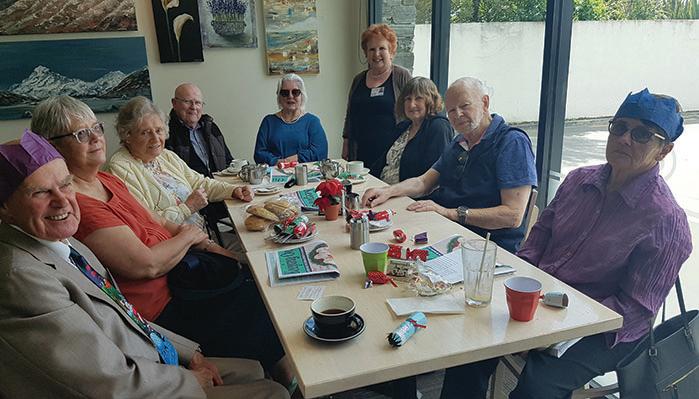

VOLUNTEER HOSTS REQUIRED FOR SOCIAL OUTINGS
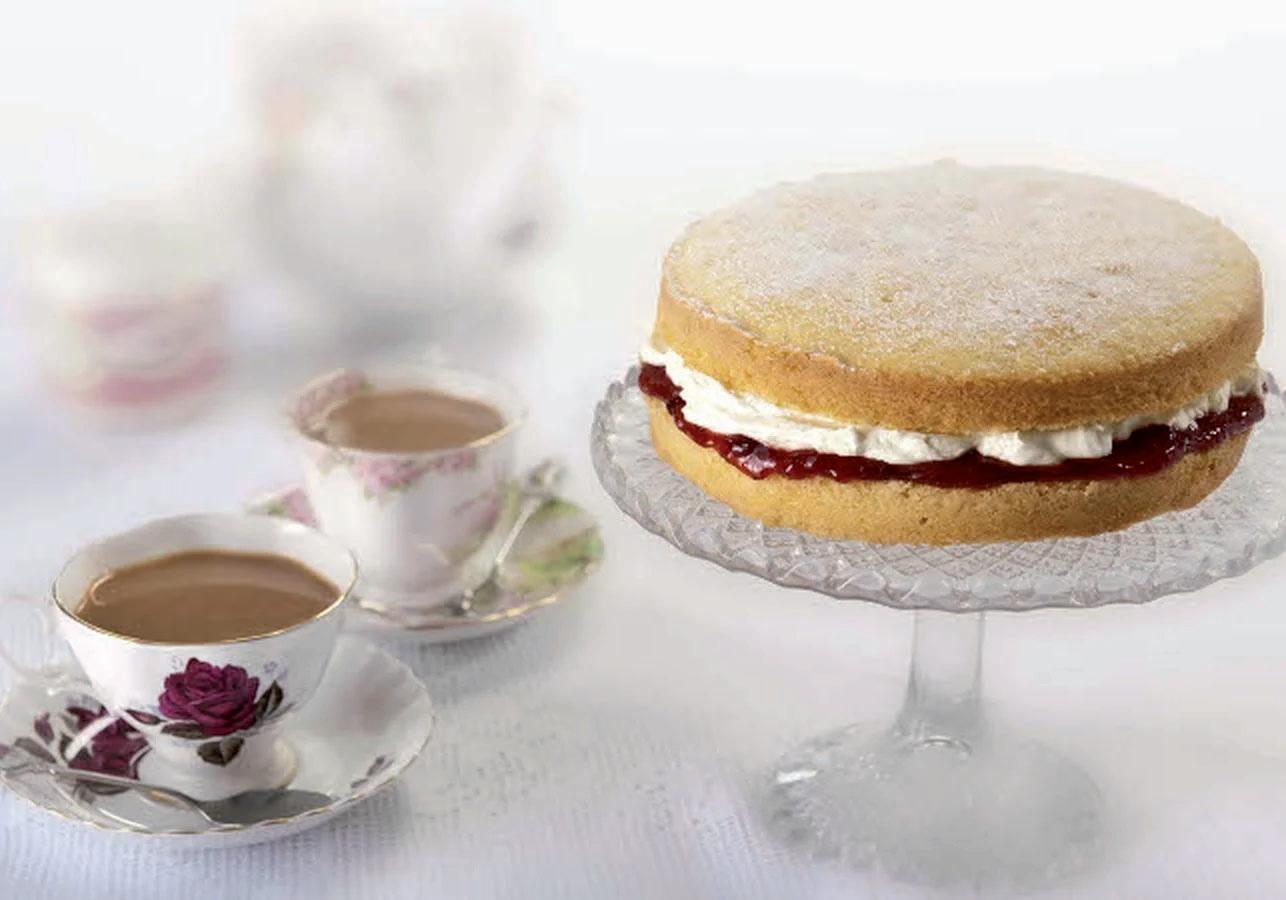
Hosts provide a morning or afternoon tea at their own venue to a group of 5 to 9 clients. Monthly or casual basis.
For more information please contact: Debbie Garraway on 331 7814 or email dgarraway@ageconcerncan.org.nz: Robynn Walsh on 331 7801 or email robynnwalsh@ageconcerncan.org.nz
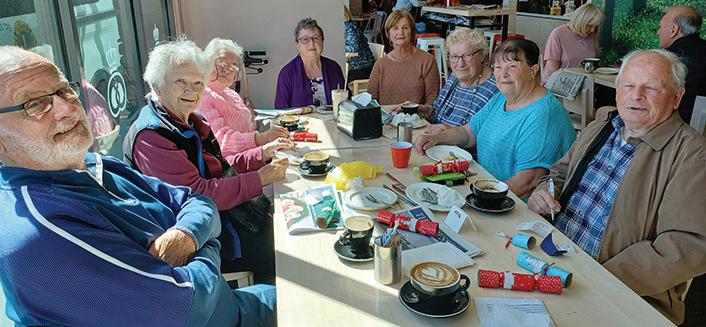

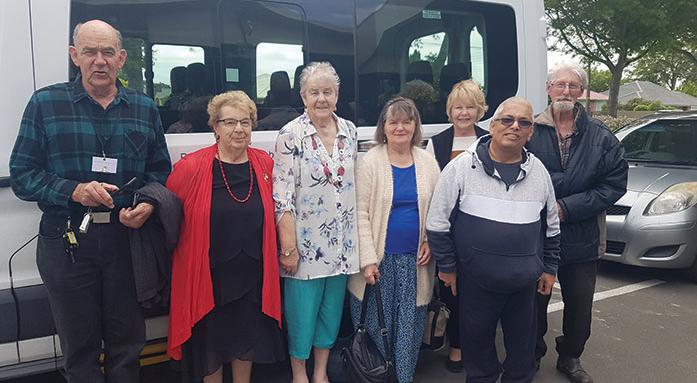
VOLUNTEER VISITORS NEEDED



Could you spare a little time to become a volunteer visitor?
Many older people in your community are lonely and isolated as they receive few or no regular visitors. Age Concern Canterbury’s Visiting Service helps reduce the loneliness by providing friendship and companionship through a volunteer visitor. We provide full training and support and ask that you commit for at least 12 months, one hour per week.
Visitors are needed in Templeton, Kaiapoi, Hornby and Selwyn District.
If you’d like to make a real difference to an older person’s life please contact Rebecca or Peter at Age Concern Canterbury on 366 0903.
FEBRUARY 2024 Keeping On eeping On 20
Halswell Cafe Group
Hei Hei Cafe Group
Linwood Cafe Group Queenspark Cafe Group
Sockburn Cafe Group St Albans Cafe Group
V C t c
Providing gifts to cardiology patients on Christmas Day
Christmas is often a time when people think of their families and friends. Being in hospital, far away from them, can add a layer of emotional anxiety on top of everything else that is on one’s mind. To give Cardiology patients a gift on Christmas Day, regardless of whether they are from Canterbury or farther afield, is something that our staff started to do in 2022, and will continue to support.
On Wednesday 20th December 2023 Chief Executive, Greta Bond, and Howard Jamieson met with Registered Nurses, Amelia and Sarah, and Ward Clerk, Jenn Nelson. They happily accepted the consignment of Christmas gifts in the absence of Charge Nurse Manager, Margaret Cumming. A further bag of treats was set aside
– without having to bear patients’ dietary needs in mind – for the staff to enjoy on Christmas Day.
On Christmas Day the gifts were gratefully received by the patients, making their stay in hospital at Christmas that much better. One patient was originally from Ukraine and she was very touched by such a lovely act of kindness, and knew she had come to a good country to live.
As we settle into the new year we are constantly reminded of the small things, a few kind thoughts, that can make a power of difference to someone in a challenging situation.
We are mindful too of the staff on the floor who look after all of those in their care. We are grateful for our ability to give and share positively.
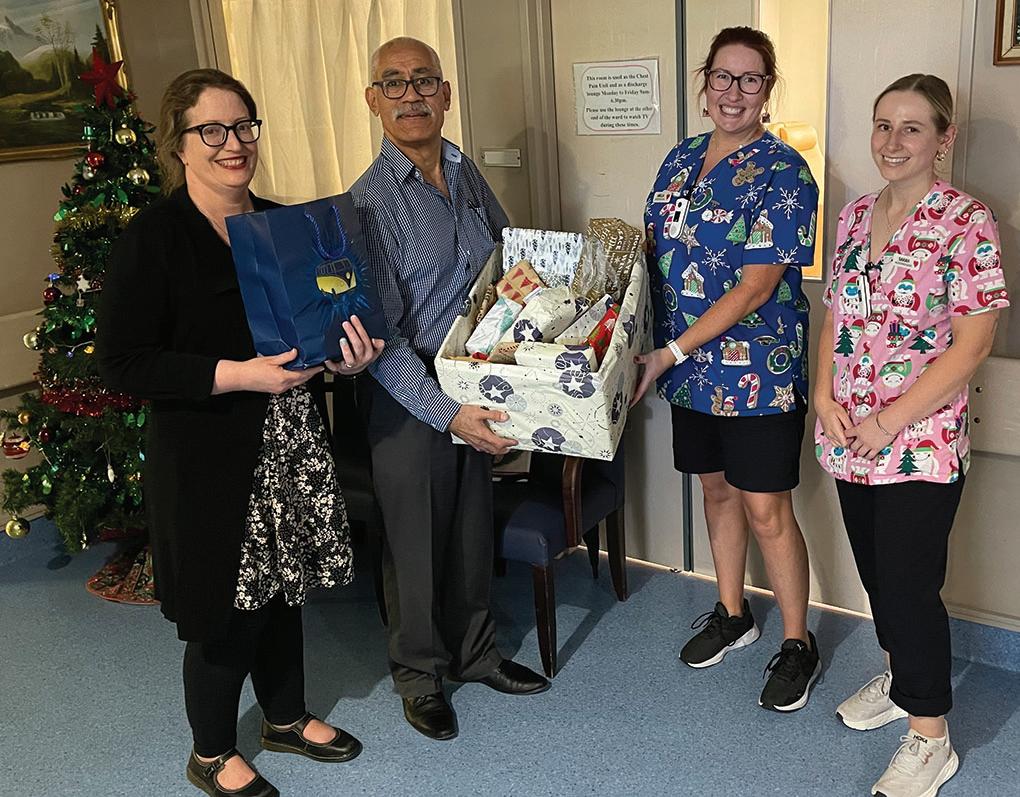
Get to know our volunteers: Graeme Bell
Last issue of Keeping On we began to introduce our volunteers by asking these very busy people, ten quick fire questions so we could get to know them better.
For this issue I asked volunteer driver Graeme Bell, and while initially willing, he did baulk when I showed him an example of the questions. However, a few days later, Graeme and I sat down to chat, and I learnt a little bit more about this very affable, generous man.
1. When did you begin volunteering for Age Concern Canterbury and why?
“A casual conversation over a beer with friends at the Cashmere Club, was what prompted me to enquire about becoming a volunteer driver at Age Concern Canterbury. My mate Bill was already volunteering for the organisation and I had done a bit of volunteer driving for a recent Golden Oldies tournament and enjoyed the experience. My wife and I had recently done a Safer Driving course through Age Concern Canterbury, and we were impressed by what the organisation had to offer. When I initially enquired it was during Covid times, so it was October 2021 before I got underway”
2. If you could travel to any

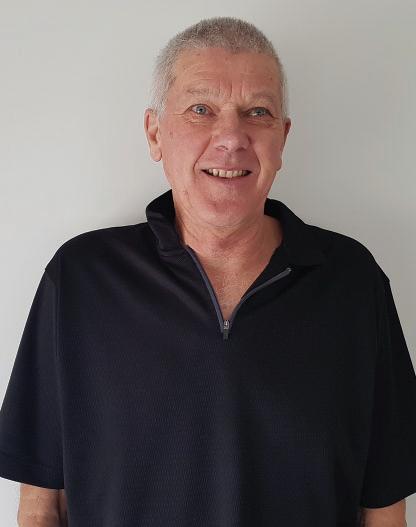
country in the world, where would you go and why?
“I have travelled to Australia and Hawaii and some unusual destinations including Chatham and Pitt Islands, and Papua New Guinea, but really, I don’t have any desire to go where there are lots of people. I haven’t seen all New Zealand and there are places in our own country I’d like to visit.”
3. What is the best advice you ever received?
“Watch and learn. Invariably
because I don’t listen (don’t shut up). But I have learned that I do learn better by observation.”
4. What is your guilty pleasure?
“Collecting bank notes and coins and Moorcroft pottery. We lost a few pieces of the pottery in the earthquakes (along with the house) so when we rebuilt my wife designed special shelves in the entrance way to display it and keep it safe.”
5. If you could have dinner with any three people, dead or alive, who would they be and what would you talk about?
“Peter Snell, Charles Upham and Ed Hillary. I’m really interested in their stories, not when they became famous but their background stories. Today we know every little thing about every famous person, but I’m interested to know what is it that makes a farm labourer become a hero, why did a great runner become a scientist and why did a beekeeper think he was able to climb Mount Everest? It is their background stories I would like to discuss with them.”
6. What is something you are proud of but never get to brag about?
“I ran a successful business for 39 years. It was a furniture removal
business and I mainly worked in the Christchurch and Canterbury area. It was particularly busy after the earthquakes. We often received word of mouth referrals, which was the best compliment.”
7. Tea or Coffee?
“Either.” (Although we at Age Concern Canterbury know it needs to be accompanied by a biscuit or two)
8. What is something you wish you knew how to do but never learned?
“I would really like to be able to drive a computer. I can do what I need to do but would like to do a bit more like moving things around and copying etc.”
9. Favourite movie, book or song?
“The Power of One by Bryce Courtney. It’s the story of a young man who overcomes a hard upbringing to become a great boxer.”
10. What do you enjoy most about volunteering at Age Concern Canterbury?
I enjoy meeting people and getting to know them and their stories. The people (clients and staff) have become like an extended family - but without the baggage!
Keeping On eeping On 21 FEBRUARY 2024 Proof Read DeirdreHazelAnna-Marie Social Connection Team – Age Concern Canterbury Phone 366 0903 or www.ageconcerncan.org.nz For the Visiting Service ask for Rebecca Hopgood or Peter McGrath. For Social Outings ask for Debbie Garraway or Robynn Walsh.
Greta Bond and Howard Jamieson from Age Concern Canterbury presenting our staff Christmas Gifts for Ward 12 Appeal. Registered Nurses, Amelia and Sarah accepted them for the Ward patients.
Age Concern Canterbury Volunteer, Graeme Bell
House too hot? Get insulation to keep cooler!
Have you been uncomfortably hot at home during the warm summer days? An extra layer of insulation does not just keep your house warm in winter, it also keeps your house cooler in summer. It may make all the difference to the comfort of your home and very generous government subsidies are available for eligible homeowners through CEA Charitable Trust.
If your SuperGold card is a combo card (and includes the Community Services Card, check the back of your card for “NZS/CSC”), and you own the house you live in, you may receive an 80-100% subsidy on insulation. CEA Charitable Trust is an officially registered provider of the government’s Warmer Kiwi Homes scheme which offers the insulation subsidy. As a charitable trust we also have access to other funding in addition to the government’s subsidy and may be able to top up the government’s subsidy to 100% if the remaining cost is a problem for you.
Many homeowners think their house is properly insulated. However, if your insulation was installed before 2008, it is very likely that it needs a top-up. Before 2008 lower levels of insulation were installed and nowadays higher levels of insulation are recommended to keep cooler in summer and warmer in winter. A properly insulated house, insulated to today’s standards, can keep you healthier and more comfortable.
If you are unsure when insulation was installed, our energy assessors can do a free, no-obligation check. Subsidies are also available for those without a SuperGold combo card who live in a lower income area (decile 7-10). Just give us a call or email us your address and we can check whether your address qualifies.
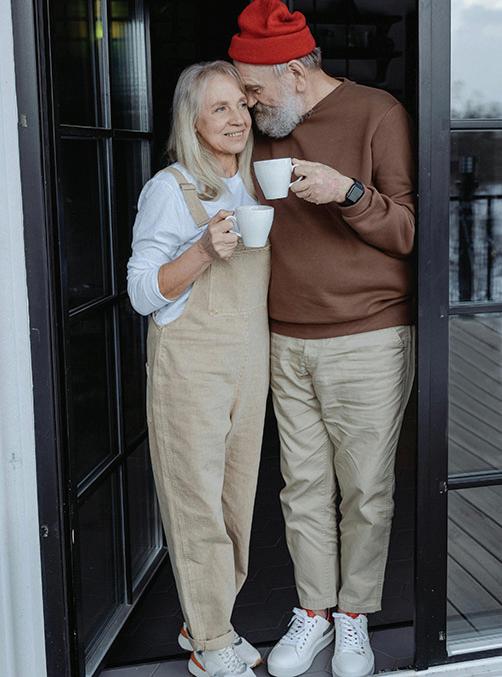
Be more comfortable at home by updating your insulation with Government subsidies.
CEA will work with you to make the process as easy and smooth as possible and our installers tidy up after themselves, leaving no mess. These are just some of the comments our customers have sent us: “Your team worked quickly and professionally”, “wonderful, efficient and friendly service”, “polite and hard working, with no clean-up needed”, “courteous, hardworking and helpful”, “competent in every way”.
All private rental properties need to be insulated by July 2025 at the latest, and Kāinga Ora properties by July 2024. If you think your private rental still needs to be updated for insulation, ask your landlord to contact CEA sooner rather than later. We expect to be very busy closer to next year’s deadline and may not be able to help landlords who leave it to the very last.
For more information and to make an appointment call 0800 4389276, email CEA Charitable Trust on info@ cea.co.nz or visit www.cea.co.nz.

Trevor benefits from Staying Safe course
Trevor Rigby is an active communityminded 84-year-old who appreciates staying connected to people, places and activities he loves by being able to drive. Church activities, playing his guitar and singing make his life rich and being able to drive gives him the ability to attend music practice with friends, go to country music festivals all around the country and so much more.
Trevor has attended Staying Safe twice - he is certain attendance helped him pass his medical with his doctor, as he was able to show he is up-to-date with key road rules such as the passing and turning ones. Trevor says the material is very relevant and helpful, as is having a certificate of attendance to show the doctor.
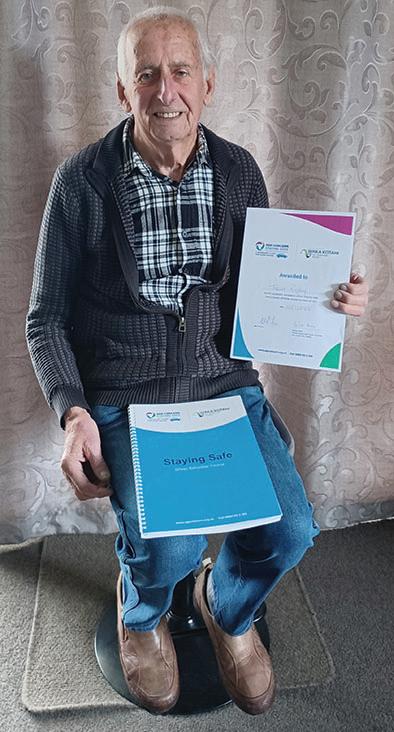
Trevor shares the driving of their motorhome with his wife who he says he can rely on to give him regular feedback on the quality of this driving. He is proud of his clean driving licence and his knowledge of the road rules. Trevor highly recommends Staying Safe to others and says attendance helped him enormously to be able to keep on driving safely.
AGE CONCERN CANTERBURY
FREE Staying Safe Refresher Driving Courses
10.00am to 2.00pm. Light lunch provided (donation welcome)
2024
Friday, 8th March, Age Concern Canterbury, Papanui.
Monday, 18th March, Burwood, Christchurch.
Tuesday, 19th March, Heathcote, Christchurch.
Wednesday, 15th May, Lincoln.
Tuesday, 21st May, Rangiora.
Friday, 31st May, Ashburton.
Course dates are continually being updated so please phone 03 366 0903 to register or to enquire about future courses.


CLUES: (Legend: fl= combo due; * = cryptic due; §=sounds like; oo=anagram
Across: 1. Hydrometrical, 8. Lea, 9. Abominate,10. Seasoner, 11. Viva, 13. Crisis, 14. Begird, 16. Alas, 17. Quandary, 20. Primroses, 20. Primroses, 21. Ing, 22. Nonresistance.
Down: 1. Halts, 2. Dramatisation, 3. Oratorio, 4. Epopee, 5. Rail, 6. Clarification, 7. Leeward, 12. “Means Sit”, 13. Crampon, 15. Muesli, 18. Yogie, 19. True
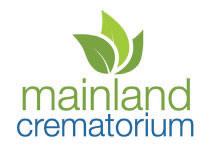
FEBRUARY 2024 Keeping On eeping On 22
Crossword Answers (240201)
0800 27 28 29 $1800 incl. GST www.mainlandcrematorium.co.nz Flexibility and freedom for families to customise a service their own way 2,200
Trevor Rigby.
UPDATE FROM THE CLUBS
Amberley Friendship Club 64 members enjoyed a Christmas meal at the Better Half restaurant in Leithfield. Some highlights of 2023 were: August - a guided tour of Te Pae, Christchurch Convention Centre followed by lunch at the Kaiapoi Golf Club; September - a visit to Ngaio Marsh’s historic home in Cashmere before lunch at the Sign of the Kiwi and in October a bus trip to the Xmas Fete at McLeans Island. The Club’s birthday was celebrated in November with a delicious catered morning tea and birthday cake followed by an entertaining quiz. A couple of our speakers have been Peter Pryor from the Canterbury Charity Hospital, The NZ author, Jo Bailey discussing Life Stories. The next speaker will cover Drugs Free Dogs.
Meets on the 3rd Tuesday of each month for interesting speakers and a good chat over a cuppa.
Coffee mornings are held monthly at local cafes and vineyards. Most months a bus trip goes into Christchurch and surrounding areas.
Contact: Keith (President) 027 348 8611 or Sue (Secretary) 03 314 8659. All enquiries welcome.
Amberley Welcome Club meets on the third Wednesday of each month. Shared lunches, speakers, bus trips.
Contact: Pat (President) 03 314 8272 or Bev (Secretary) 03 314 6716. All enquiries welcome.
Christchurch Red Hatters Club No set meetings but the Club has ‘gatherings’ which includes monthly events such as luncheons, dinners and an outing/activity. Contact: May Stuart on 027 4071909.
Christchurch Senior Citizens Club holds cards on Mondays from 12.30pm to 3.00pm and runs indoor bowls on Tuesdays from 12.45pm to 3.00pm. In addition the Activities Group has outings for meals, social days, visiting places of interest and bus trips throughout the year. Contact: Veronica on 383 4682 or 021 1187360 or Beth on 388 2375 or 027 2610493.
Lincoln Area Senior Citizens Club enjoyed or are looking forward to, the following: 5th December 2023 a Christmas Lunch at Lincoln Bowls Club Hall with Selwyn Lions catering team and Christmas music from Doug Corbert; 6th February 2024 a Mystery Coach Trip followed by lunch at the Crate & Barrel, Leeston; 5th March the Club’s AGM followed by afternoon tea, recycling sales table and a raffle.
Meetings are the 1st Tuesday of the month and start at 1.30pm in Lincoln Event Centre. Outings are from the Event Centre.
New members welcome.
Contact Evelyn 027 712 7195 or Gloria 027 434 6554.
Papanui Combined Probus Club Meet: 1st Tuesday of the month at 10.00am at the Papanui RSA, 1 Harewood Road. Good parking. Contact: Marie 03 3517708 or Sian 03 3590057.
AGE CONCERN CANTERBURY IS LOOKING FOR Energetic and reliable cleaners are required to clean houses for older adults living in the community.
Make a date with
serenity
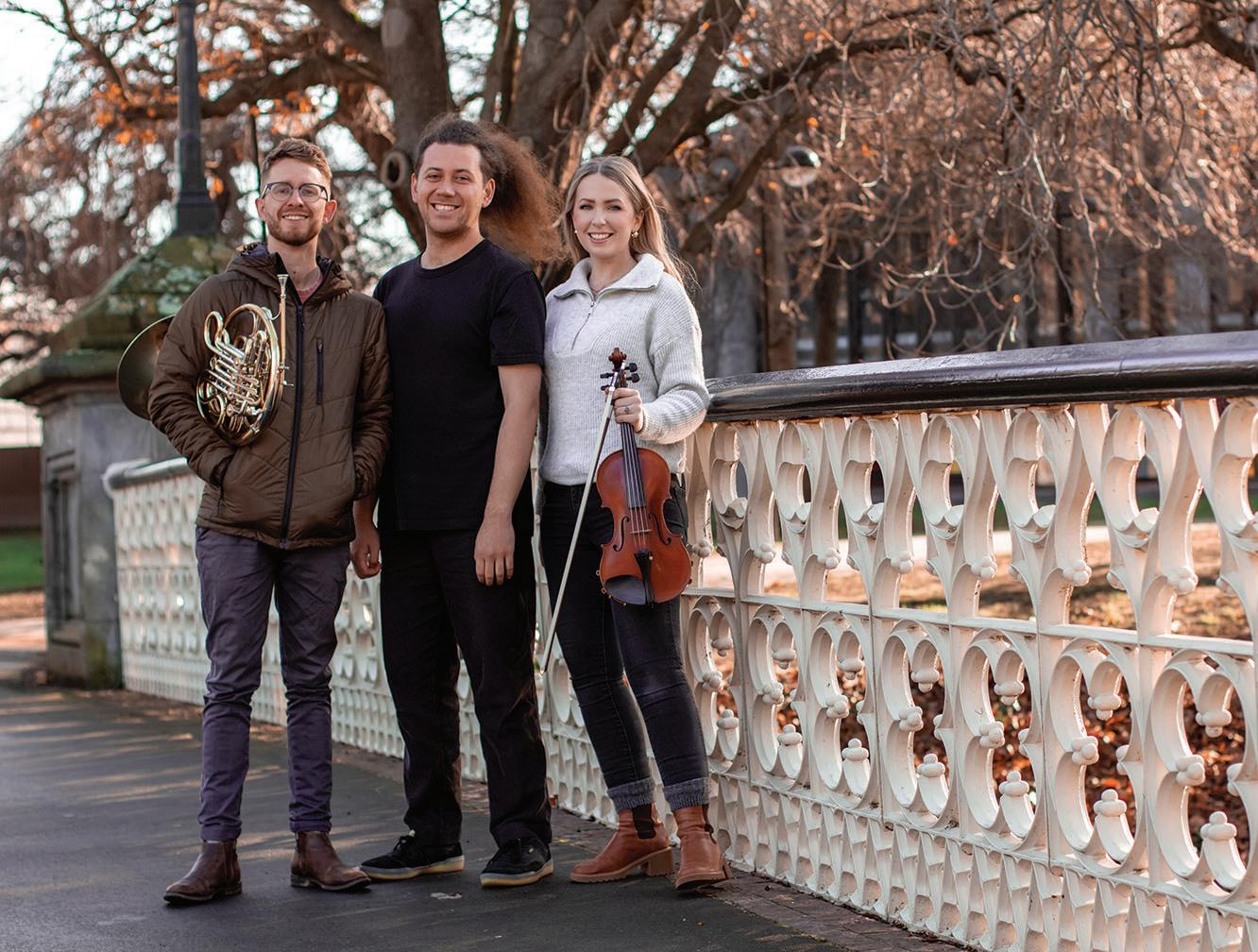
The 2024 season of Great Hall Lunchtime Concerts at Te Matatiki Toi Ora The Arts Centre starts on Monday 26 February. For the first concert, the talented trio of Fiona Pears (violin), Connor Hartley-Hall (guitar) and Dan Robertson (piano) mix up fiery gypsy jazz alongside heart-warming ballads.
There will be over 20 concerts held on selected Mondays throughout the year. The regular timeslot is 1.10-1.50pm. Most of the musicians featured in the series are Christchurch residents. Many are much-loved names, including Yulia (vocalist), Michael Endres (piano), and percussionists Brett Painter and Roanna Funcke. Others may be more surprising, such as Helen Webby who is emerging from the back of the Christchurch Symphony Orchestra with her harp to perform solo pieces this year.
In November, the series hosts the Karlsruhe Concert Duo of Reinhard Armleder (cello) and Dagmar Hartmann (piano) from Germany.

The ensemble has won international competitions in Italy and France and toured worldwide to great acclaim. Check The Arts Centre’s website for details of the full programme.
Lunchtime concerts are already a fixture in many people’s calendars. Forty minutes of beautiful music in the gorgeous Great Hall provides a wellspring of sanity in the rush-rush of life. Regular concertgoers tend to grab lunch or a coffee with friends on either side of a concert, making the most of their time out.
The Great Hall Lunchtime Concert series is organised by Concerts for Christchurch, with the assistance of The Arts Centre. You can get discounted tickets by becoming a friend of either organisation: Concerts for Christchurch Friends and Friends of the Arts Centre are charged $15 (plus Booking Fee) per concert, $5 off the full adult price.
If you can, it’s best to book in advance via www.artscentre.org.nz. Seating is first-come-first-served. A


Keeping On eeping On 23 FEBRUARY 2024
Jonathan Tanner
The Moreton Trio, comprised of Arna and Alex Moreton (violin, French horn) and Liam Wooding (piano) have performed both nationally and internationally to great acclaim.
For more information please phone Liz /Deb on 366-0903 Drivers licence and an appropriate level of fitness is required. Casual work only. Payment is on an hourly rate. ENERGETIC AND RELIABLE CLEANERS Needed in all areas
If you're a Christchurch resident with a pup named Bella, you’re certainly not alone.
There are 522 dogs named Bella registered in Christchurch and Banks Peninsula, making it the most popular dog name in the region.
Marion and Ron adopted their Bella, a five-year-old heading/collie mix, in April 2023.
“We’d been wanting a dog for quite a while, but weren’t sure how to go about it,” says Marion.
“Back in our day there were animals and livestock advertised at the back of the newspaper, but everything’s online now and we don’t know how to work it so we wondered how we could adopt a dog.”
Marion and Ron made their way to Christchurch’s Animal Shelter and met with the team, and then met a pup named Bella.
“We wandered down the kennels and lots of the bigger dogs were barking, but Bella came straight to the gate, wagging her tail,” says Marion.
“She loves kids and has an awesome nature. She’s always on bird patrol and runs up and down the section on the fence line to chase away the birds – she’s far too slow to catch any though.”
Another Bella was adopted from the Shelter in May 2023 by residents Courtney and Jotham.
The pair says that while they briefly considered renaming the huntaway/ golden retriever since it’s such a common name, Bella was there to stay.
“We were so happy to be able to adopt her,” says Bella’s owner

Courtney. “She is the cuddliest dog and loves nothing more than hopping into bed with us in the morning or night.”
Other than Bella, Christchurch’s most popular pooch names include Charlie (465), Poppy (440), Molly (385), Max (378), Ruby (372), Luna (366), Daisy (302), Archie (294) and Rosie (273).
Some dog owners took naming inspiration from their favourite All Black, well-known rockstars or fictional characters.
There are three Richie McPaw’s (and one Richie McCaw), four Sonny Bill’s and an Israel Dogg living in Christchurch. Yet while there’s five Jordie’s, two Beauden’s and two Scott’s, there’s unfortunately no Barrett’s.
You might come across an Indiana Bones, a Tommy Shelby, John Snow, Xena Princess Warrior or Obi Wan
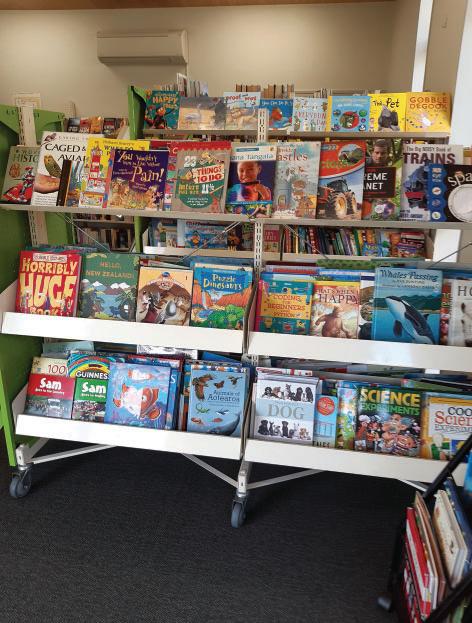
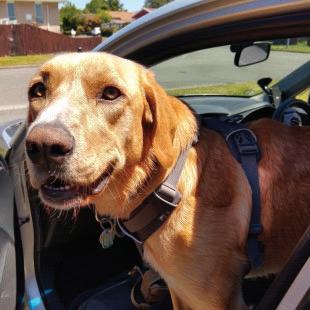
Labrador Retriever (5272)
Staffordshire Bull Terrier (2983)
Border Collie (2700)
Bichon Frise (1841)
Jack Russell Terrier (1572)
Did you know this?
Did you know this? Although you may specify in your will that a specific asset is to go to a specific person, how you actually own that asset might defeat your intentions?
A common example is when a person has re-partnered up in later life but has children from a previous relationship.
They might want to leave certain property to their children, and they may make a Will recording exactly that, but if they own that property jointly with their new partner, then their wishes could be thwarted.
Why is this? Shouldn’t they be able to treat their property however they like?
The answer (as with many legal questions) is “not exactly”. It depends on how that property is owned.
There are two main ways to own property with someone else – as “joint tenants” or as “tenants in common”.
Joint tenants is where the property
is owned in unspecified shares. Property owned as joint tenants will automatically pass to the survivor and won’t be part of the estate of the person who has died. An example of this can be seen on a record of title for land, where the registered owners may simply be recorded as “Jane Smith and John Smith”. When Jane dies, her interest in the property goes to John.
Alternatively, property can be owned as “tenants in common” where the shares of ownership are specified. The principal of survivorship that applies to a joint tenancy doesn’t apply to a tenancy in common. So for the re-partnered couple, this is a good option to use, in conjunction with the Wills.
At Godfreys Law we offer estate planning expertise to help people achieve what they want under their Wills. A


FEBRUARY 2024 Keeping On eeping On 24 REAL PEOPLE. REAL SOLUTIONS. Gina Dobson For expert planning and advice in your twilight years For expert planning and advice in your twilight years Charles Mullins Senior Associate Maddy Currie Solicitor (03) 366 7469
Heathcote Valley Community Voluntary Library Heathcote Valley Community Centre, 45 Bridle Path Road, Heathcote Valley Open: Monday, Tuesday, Thursday and Friday from 2.00 to 4.00pm, Wednesday 11.00am to 12.00 noon, Saturday 10.30am to 12.00 noon. No charge for membership. New book rental is $1.00 for 3 weeks and older adult books .50 cents for 3 weeks. Childrens book rental is free.
Kenobi at your local dog park. You may even hear a call for a Billie Joel, Bon Jovi, Johnny Cash, Stevie
Wonder or Bob Marley. The most popular dog breeds
Bella the huntaway/golden retriever
Pup, Bella, is having a ball wth Marion and Ron ADVERTISERS Book your advertising for Keeping On May 2024. Deadline for ad bookings is Friday, 26th April 2024. Contact Anna-Marie on 331 7804.
Marion and Ron met a pup named Bella at Christchurch’s animal shelter.
Too many products are easier to throw away than fix – NZ consumers deserve a ‘right to repair’
There was a time when the family washing machine would last decades, with each breakdown fixed by the friendly local repair person. But those days are long gone.
Today, it is often faster, easier and cheaper to replace household items, even when they are meant to be repairable.
This is not just a consumer issue. Only about 2% of New Zealand’s e-waste is recycled, meaning most of our electrical goods are ending up in landfills.
And the problem is likely to worsen as more appliances use software. This allows manufacturers to limit the lifespan of their products. Copyright rules on that software are making repairs even more difficult – and potentially illegal.
So what can be done to protect consumers and the environment from appliances with deliberately short lives? Our research found changes are needed to a range of laws, including copyright law, to enshrine the consumer’s “right to repair”. The government can look overseas to see how this can be done.
The right to repair
The concept of a “right to repair” is relatively vague. But essentially, products need to be designed to last longer and be repairable.
Manufacturers also need to ensure repairs can be done with commonly available tools, and that spare parts and repair information are available.
While there is no single definition or set of requirements, a number of countries (including the United Kingdom, France, Australia and parts of the United States) are introducing laws establishing the right to repair, albeit to varying degrees.
But New Zealand has yet to make, or indeed propose, any such legislation.
Crucially, the right to repair is not limited to simply repairing broken electronics and appliances. Increasingly, manufacturers are using software to control how products are used through “software locks”, also known as digital locks.
For example, these have been used to stop printers working at the end of their pre-programmed life or if the owner stops paying a monthly subscription.
Consumers are then forced to choose between using expensive authorised repairers to “service” the printer, to continue paying a subscription, or to throw away their “bricked” appliance (one that has

become as functional as a brick).
Software locks are also used to prevent repairs by the owner or independent repairers, even if genuine spare parts are being used.
Just 2% of e-waste in New Zealand is broken down and recycled, with the rest ending up in landfills. simonkr/ Getty Images
Copyright infringement
Hacking a software lock is possible, but it can be a technical challenge and also a legal nightmare. Professional repairers are concerned about infringing copyright and other intellectual property rights if they repair items.
And they have every reason to be worried, with manufacturers using “intellectual property as a weapon” against independent repairers.
In New Zealand, software locks called “technology protection measures” (TPMs), are protected under the Copyright Act. Independent repairers who circumvent a TPM to repair or maintain a product are committing an offence and if prosecuted are liable for a fine of up to NZ$150,000 or up to five years in prison, or both.
But some countries have recognised that manufacturers are illegitimately using copyright to prevent repair. In the US there are narrow exceptions for circumventing software locks to repair some goods. But these are temporary and need to be reconsidered and renewed every three years.
A proposed amendment to the Canadian Copyright Act would allow the circumvention of TPMs. The amendment is currently moving through the legislative process and is expected to pass.
pairing” – allowing manufacturers to prevent a product operating correctly, if at all, after the installation of a spare part – means circumventing TPMs will not resolve all the software lock issues.
It’s a complex problem and any ban on parts pairing would require careful consideration.
Overseas, Apple has a “selfservice repair” programme, meant to allow independent repairs of Apple

products. In practice, the programme has been largely unworkable due to Apple’s demands – including handing over customers’ personal information, agreeing to years of audits, and signing non-disclosure agreements simply to get the parts.
Some of the harm of parts pairing could be mitigated by implementing a repairability label scheme, as introduced in France.
Schemes such as these require manufacturers to include labels outlining the repair of an item, and what it is likely to cost. This helps consumers make an informed decision about what they are buying, but it also requires an independent watchdog to ensure the information is accurate.
While the global right-to-repair movement is growing, none of the solutions being implemented overseas are straightforward, and all require significant legislative effort.
That said, New Zealand needs to address the issue of product reliability and longevity as an environmental issue and a consumer right.
(Source: www.theconversation.com)

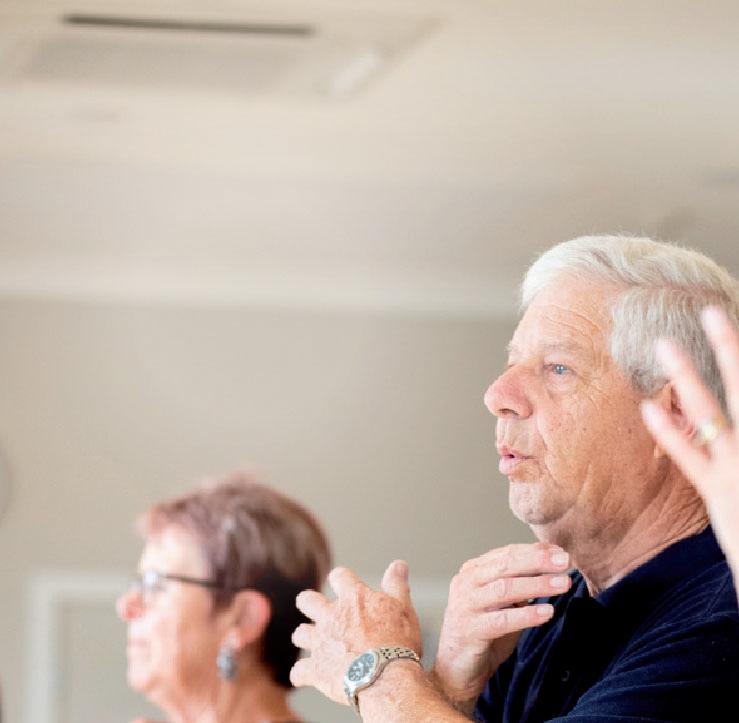

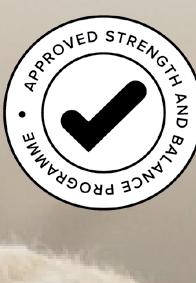





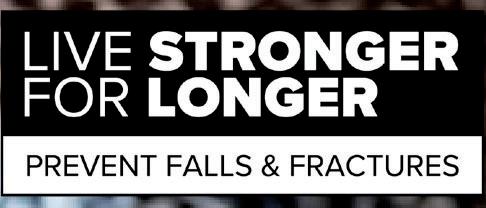


Keeping On eeping On 25 FEBRUARY 2024 Strength &Balance Improve your theTick Join an accredited class near you Visit www.livestronger.org.nz or phone Sport Canterbury on 027 771 7473
Parts pairing The growing practice of “parts
Downsizing? We refuse to be tipped out
Here we go again. Yet another survey – this time by the property website Zoopla – has found that 42 per cent of the over-65s live in a home that is too big for their needs, and that older homeowners have 10 million spare bedrooms between them.
Why don’t we do the decent thing, the survey asks, and downsize, so that families can occupy the homes we selfish old people insist on continuing to inhabit?
My friends and family are always on at me to consider downsizing and freeing up my home to more deserving, younger people.
At the age of 80, why don’t I move to a bungalow in Bicester, they ask, or into a nice retirement complex where I can play bridge and practise chair
by Liz Hodgkinson

yoga? Why should I? Who says that my home, with three bedrooms and three bathrooms, is too big?
Ever since King Lear’s daughters ordered him to get rid of his 100 retainers, old people have been
bullied into taking up ever less space, moving to a granny annex in their children’s garden and getting rid of their lifetime’s possessions.
I’m perfectly happy in my fourthfloor Victorian flat in North Oxford,
even if I do have to climb up and down 100 steps every day. I can manage them with ease, and I still enjoy titivating my home and keeping it up to date.
If I become incapacitated in the future, there is plenty of space for a carer to live in and look after me.
I can’t be bothered with the upheaval of moving, and culling my books, diaries, paintings and furniture to fit into a tinier place. Nor can most of my friends, many of whom are well over 65.
While we are able, we are staying put in the homes we have lovingly created over the years. We refuse to be tipped out.
(Source: www.theolide.co.uk)
“Our residents are telling us that sustainability is important to them.”
Sustainability is important to Arvida and its residents, and that has seen the operator take out an award in the RVA’s Sustainability Awards two years running. To understand the thinking behind this commitment, I recently talked with Arvida’s Head of Sustainability and Compliance, Arveen Horsfield.
Recycling and tackling food waste
So far, at a national level, Arvida has been concentrating its efforts on waste management, both in its care centres and retirement communities. An initial audit showed that food waste accounted for the largest amount of waste, followed by sanitary waste from care centres. The third highest category was misplacement of items that could in fact be recycled. This indicated a need for better resident awareness about recycling – what can be recycled, and how and where to do that.
So Arvida committed to get to every one of its retirement communities and talk to residents, with a local council recycling expert. In the past year, 24 of those sessions have reached more than 300 residents; those residents who attended meetings have then spread the message to others who didn’t. Arveen says, “With waste management, residents encourage each other in our communities. You can tell the engaged communities by the statistics, and we hear reports of discussion after the information sessions we hold.”
To tackle food waste, Arvida has focused on its care centres. Initial audits provided baseline data and
key information. The next step was talking with residents, to get ideas for ways to tackle this and also understanding and buy-in. A trial is underway in Aria Park, involving residents in menu design and choice. The initial food waste trial was funded by Arvida; now the operator is accessing some funding from the Ministry for the Environment to help with this.
In Auckland, Arvida also has a composting partnership underway with Greencycle. Green waste is collected from Arvida communities and composted, then the compost is returned to the village for use in the gardens.
Using refurbishment waste
Another waste management project being planned will focus on recycling or reusing refurbishment waste, for example curtains that are being replaced. Other sustainability projects in the pipeline include a framework for putting in EV chargers across the Arvida retirement communities, and exploring the viability of solar panels including batteries to enable storage.
Arveen stresses that all projects and solutions must be locally viable and appropriate. She says, “There has to be a careful balance between a national framework and local needs and variations. We always need to focus and work on local solutions.
Frameworks must be enabling, and not create extra work for local staff And embedding initiatives is much easier, and success is more likely, if initiatives are resident-led.”
Projects big and small are all part of the picture
Some local initiatives are long-term and significant; others can be as small and personal as the one led by a resident from Arvida Oakwoods in Nelson who collects fellow residents’ empty jars and takes them to a local op shop. Oakwoods and its sister community, The Wood, are also known for their Rickshaw Rides, a programme run with Age Concern Nelson Tasman; volunteer cyclists take residents out for rickshaw rides, a mix of sustainable transport and great fun. Cycling is a focus for Arvida’s residents in a number of communities, as is gardening.
Down the road from Oakwoods at Arvida’s Waimea Plains, residents build vertical gardens in the workshop, supplying them free to interested residents and also selling them to community members outside the village.
Arvida St Albans residents look after vegepods and raised gardens which benefit other residents and the wider community. Their crops are used for salads and meals within the community, with excess sold at local markets. So far, they have raised over $3,000 for charity from selling their crops.
So why is sustainability so important to Arvida? Arveen tells me, “We are essentially resident-led, and our residents are telling us it’s important to them. I get lots of emails from residents – they care about this stuff, they feed their views back to their village manager.”
Residents and Arvida’s leadership are well aware of the benefits to the wider community beyond the village gates, and to the planet. It's not just the planet that benefits; there are clear benefits for Arvida. Aside from the obvious cost savings in reducing waste, there’s also evidence that being sustainable is enhancing Arvida’s reputation. Arveen reports that prospective staff say at interview that they’ve read the annual report and really like what Arvida’s doing about sustainability, so the organisation’s commitment is helping to attract people aligned with their principles and goals.
Where to start?
I asked Arveen for her advice about where operators can start with sustainability projects. She tells me, “It’s all about scale! Food waste is a great place to start – it accounts for about one third to half the waste from care facilities. In places like Auckland and Tauranga it’s relatively easy to get started because the local city councils have collections.” Arvida also encourages and supports “waste champions” at every site.
Arveen’s role at a national level is focused on enabling initiatives. “My job is all about making it easy. If you’re a resident proposing an initiative, you need to be able to show that it can be done – that it’s practical, easy and will make a difference. Make sure you highlight the positives. Then we come in alongside you to help put things into action. And if it works, we’ll look to extend it across other communities where possible.”
Keeping On eeping On FEBRUARY 2024 26
Retirement Villages Association
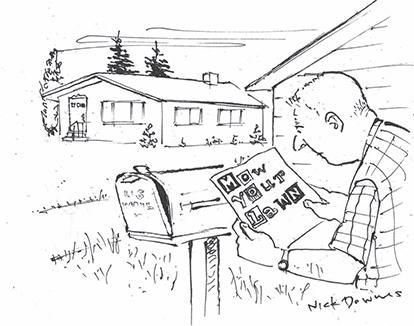
What’s love got to do with it?
The late Tina Turner famously asked this question while recording her fifth studio album in 1984.
Unfortunately for Mrs Turner, she didn’t have a lawyer with her in the studio at the time of recording to let her know that when it comes to protecting your assets, love can have a lot to do with it.
The Property (Relationships) Act 1976 provides for equal sharing in the event of separation either of a marriage or de facto couple.
‘De facto couple’ is how the courts define relationships in which the two parties have spent three years together in a relationship, have a child together or one party has made a significant financial contribution to the relationship.
Jack Hodgins, Solicitor has seen an increase in client’s who have been widowed and have since formed new relationships which may be considered by the courts to be de facto relationships and as such liable to equal sharing under the Property (Relationships) Act 1976.
When ascertaining whether a relationship is de facto or not, the

courts look at a wide range of circumstances including:
• how long the relationship lasted,
• the extent to which the couple share a home,
• whether they have a sexual relationship,
• their financial and property arrangements and how much they depend on each other,
• their ownership, use and purchase of property,
• how committed they‘ve both been to a shared life,
• their care and support of children,
• who does the housework and other household duties,
• if the partners are known to family and friends or other people as a couple.
If you believe yourself or someone you know may be in a de facto relationship and would like to know how to protect their assets, please contact the team at Kannangara Thomson Law who would be happy to talk to you about whether contracting out of the Property (Relationships) Act 1976 is appropriate. A

From multiple news outlets we are subject to an incessant narrative of global conflict, racial tension, violence, inequality and procrastination on climate action. Join us at WEA for reliable information and an opportunity to discuss and debate these issues among people with shared values. A strong injection of factual information, new initiatives, stories of hope and optimism, as well as the camaraderie with like-minded people, can help you to build mental and emotional resilience.
Term 1: Monday, 5th February 2024 until Wednesday 3rd April.
Friday 1st March 2024: QUEEN OF KATWE, 1.00 to 3.00pm. Free.
This film depicts the life of Phiona Mutesi, a girl living in Katwe, a Kampala slum in Uganda’s capital. Slum life is a constant struggle for Phiona and her family. Robert Katende teaches children to play chess at a local ministry. Curious, Phiona visits, learns the game, and becomes a National Champion under his guidance.
Wednesday, 6th March 2024: MARINE ENVIRONMENTS AS A STORE OF CARBON, 6.30 to 8.00pm. $koha.
The marine environment stores huge quantities of carbon in living organisms, sediments and dissolved in the water. Perhaps we can enhance the draw down carbon dioxide from the atmosphere and help solve the climate crisis.
Friday, 8th March 2024: DEEP RISING: FILM SCREENING, 1.00 to 3.00pm. $koha (Thanks to Roco Films who are sponsoring the screening)
A tale of geopolitical, scientific, and corporate intrigue exposing a secretive organization that will extract metals, essential to the electric battery revolution from the deep seafloor. Narrated by Jason Momoa, it illuminates the vital relationship between the deep ocean and life on Earth.
Book courses online at Courses Christchurch adult education, courses and events (cwea.org.nz) or visit us at 59 Gloucester Street from 9.30am to 3.00pm, Monday to Friday to sign-up.
Affordable central city room hire for meetings and events see Hire Rooms Christchurch adult education, courses & events (cwea.org.nz)
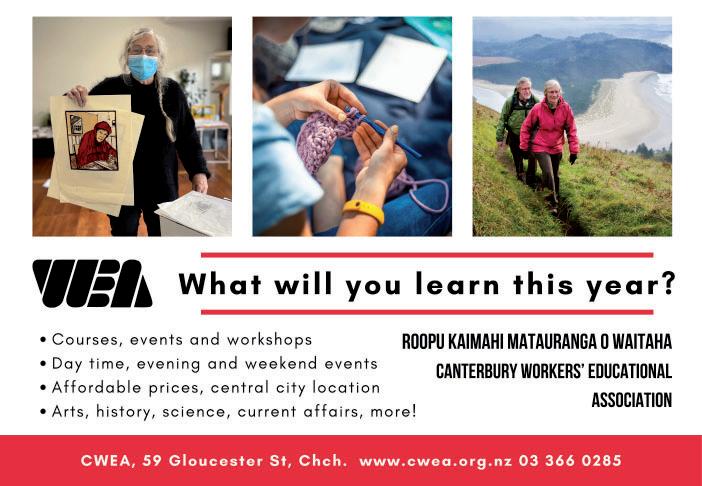
Keeping On eeping On 27 FEBRUARY 2024
Join WEA for reliable information
(Cartoon courtesy of www.theoldie.co.uk)
How to make the cut - in the Regency period, we developed brilliant ways of putting people down, says Lulu Taylor
There is someone in my town who cuts me. He walks past me without acknowledging the fact that I am there, or that we know each other.
In Regency times, cutting someone was considered a great insult and the Cut Direct the greatest of all. The cutter looked their foe in the eye, and then coldly and deliberately looked away or even turned their back. The cuttee could be under no illusion that they had been publicly ignored and deeply insulted.
The Cut Direct was more about social power as punishment, and was so potentially damaging that rules about its use had to be wary of cutting another gentleman who might take such great offence that he issued a challenge.
Hosts could not cut their guests
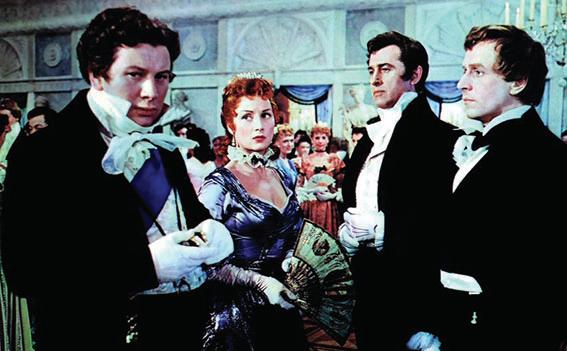
– the rule of hospitality trumped personal feelings. Spinsters could
Aspire Canterbury - inspiring independent living
Aspire Canterbury has moved to a wellness centre supporting local people to live their best life. This Centre is called the BrainTree Wellness Centre, 70 Langdons Road, Papanui, Christchurch.
Aspire supports a broad range of people with disabilities and impairments. A charitable trust established in 1982, it assists children and adults living with neurological and/or physical disabilities and impairments. It provides the following services:
• Disability Information Services: Connecting people to community services and navigation of disability and health care systems.
• Total Mobility Scheme: Discounted taxi fares for those eligible.
• Shop and hire of mobility equipment: Over 400+ mobility products to remove barriers for everyday living.
• Mobile Service: Taking services out to you in the community.
It makes a difference to the communities it serves in living a life full of purpose and meaning. Within the BrainTree Wellness Centre, you will also find Multiple Sclerosis & Parkinson’s Canterbury, Dementia Canterbury, Stroke Foundation, and Southern Music Therapy.
The centre has a couple of seminar rooms, a studio, and a subsidised social area/whole food café allowing individuals to have an experience while they visit the charitable trust/s.
The centre is available for use by the wider local community groups, providing a ‘place-based’ approach focused on engagement to access services, benefiting the people it serves.
So, come along to BrainTree, we’ll see you there! A
inspiring independent living

Shop and hire of assistive technology.
Total Mobility Scheme - 75% off Taxi’s up to a maximum of $70 (terms and conditions apply)
Mobile Services - connecting with the community.
Information Service - unbiased information, we are here to listen and help you.

Ph:
Kindest Cut.
In Regency society, a cut delivered by a person of fashion or status had the power to destroy lives. It could result in total ostracism. The wilderness beckoned and the shame could last for more than one generation.
not cut married women. They simply didn’t have the social clout and would have looked ridiculous if they’d tried to exert it.
The Cut Indirect has the cutter looking straight at the cuttee but pretending not to know them, simply removing their gaze as if they have no idea that they are cutting, though both parties know very well what is being done.
This passive aggressive form of cutting, perhaps more weaselly in its pretended innocence and more insulting in its belittlement.
For all its rudeness, the Cut Direct has a certain respectful quality, at least acknowledging the previous relationship before delivering the cut. The Cut Indirect, with its implication that there is no acquaintance and therefore no insult, is, to my mind, more cowardly.
The lesser cuts are, perhaps, easier to bear. The Cut Sublime involves staring at the rooftops, the clouds or the spire of the nearest cathedral, humming in a nonchalant way, until the cuttee has passed by. The Cut Infernal entails staring at the ground or dropping down to tie up a lace or examine a boot until the unloved object has gone.
We could add to these another, modern type of cut. The mobile phone has taken the place of the bootlace. The useful tactic of being absorbed in one’s phone, or lost in the business of composing a message on that fiddly keyboard, or the taking of a call in order to ignore a certain someone could perhaps be dubbed the Cut Cellular.
Not all cuts are wounding. When I see someone of my acquaintance whom I would normally greet but who appears hassled and harried – perhaps struggling with the infernal self-service checkout in the supermarket while being pestered by children – I pretend I have not seen them, so that they do not have to add small talk with me to their woes, unless they wish. This is surely the
The Cut Direct from the pinnacle of the ton, the Prince Regent, marked the decline of Beau Brummell’s dazzling social career. In 1813, at a masquerade ball jointly hosted by, among others, Brummell and Lord Alvanley, the Prince Regent greeted Alvanley but cut Brummell. Brummell responded, referring to the Prince Regent, ‘Alvanley, who is your fat friend?’
It was brave. Public opinion considered that the Prince had abused his power on this occasion, and Brummell survived socially – just. But debt and lack of royal patronage eventually took their toll. He fled England to escape debtors’ prison and died a few years later, insane and – perhaps worse for that greatest of dandies – slovenly in his dress. At least we can be grateful that the Prince didn’t deliver his deadly cut until after Brummell had made it fashionable for the upper classes to clean their teeth.
Cuts have nothing like the same power over social life and death now, but feeling purposefully ignored is still horrible and confusing. My cutter does not even glance in my direction, but marches by as though I am not there at all. This might be the Cut Oblivious.
Possibly he honestly doesn’t remember me, despite long conversations at our neighbour’s annual New Year drinks. As with the tiresome person who doesn’t appear to recognise you on being introduced at parties despite your having met lots of times before, you can’t be sure. Are they merely forgetful?
Stupid? Short-sighted?
Possibly they enjoy being unbelievably rude, or need to exert insidious control through erasure –the Cut Narcissistic. It’s tempting to challenge a cut, but rising to it is to show you care. They have shown they don’t. Victory to them.
The best way to respond, then as now, is with grace, good manners and equanimity. And if one desires to cut off a friend - as is sometimes necessary - then a polite but firm cessation of contact is better than any public insult, for everyone involved.
Lulu Taylor is author of The Forgotten Tower (Macmillan)
(Source:www.theoldie.co.uk)
FEBRUARY 2024 Keeping On eeping On 28
Contact us face to face or over the phone for a chat about your needs. P > 03 366 6189 • FREEPHONE 0800 347 242 P > (TOTAL MOBILITY) 03 366 9093 • 314 Worcester St, Linwood, Christchurch E > admin@aspirecanterbury.org.nz • W > www.aspirecanterbury.org.nz
CANTERBURY ASPIRE CANTERBURY is
ASPIRE
a not-for-profit organisation, established over 40 years ago
Disability
03 366 6189. FREEPHONE 0800 347 242. Ph: (TOTAL MOBILITY) 03
9093. BrainTree Wellness Centre, 70
Road, Papanui. Christchurch. Email:
www.aspirecanterbury.org.nz
366
Langdons
admin@aspirecanterbury.org.nz
Stewart Granger (second from right) in the title role of Beau Brummell (1954)
The toaster, the bunch of dahlias and Raewyn the retired travel agent
Seventy-eight-year-old Ian really likes looking on Trademe at vintage motorbikes and sometimes even before he’s burnt his toast, he’s chosen today’s new bike.
Ian keeps thinking he really must adjust the dial on his toaster but the numbers are so small and that would mean he would have to find his glasses. He spends enough time throughout the day looking for lost things so instead, he always says to himself “that can wait until tomorrow”.
It’s so much more interesting to look at the specs for this morning’s bike which is an eye wateringly expensive yellow 1962 Norton Triton. It’s a private sale in Auckland, so a bit tricky to get down to Christchurch. The last bike he owned was also yellow but when he married Sue she said “if you want a family that has to go”! So he sold the bike, but kept the helmet just in case.
Now, despite his daily searching and dreaming Ian knows full well that he couldn’t even get on a bike, let alone ride one, but he doesn’t dwell on that as that would spoil his fun. He does however enjoy reliving those free and easy carefree days when he was a young apprentice electrician.
Today is a free day for Ian as he did a big shop yesterday. There’s nothing organised at the Village and the weekly bus outing isn’t until Thursday. Ian will potter around until it’s early enough to justify a morning coffee and then he will go for a walk to the dairy to buy a paper. He could get the paper delivered but Bashir, the nice Indian man at the Dairy, is always good for a chat and they like to discuss the cricket which is not going so well at the moment. Bashir strongly disagrees with the selectors’ choices so there’s always something to mull over. Kind Bashir sometimes gives him a little container of Indian Jalebis, but sadly they’re just too sweet for Ian’s taste. He puts them in the fridge and hopes that one of the visiting staff might like them.
There’s a new lady who’s moved into Number 24 and yesterday she complimented him on his dahlias. They’re not really his dahlias, as Sue was the gardener and they had brought the dahlias from their garden in Beckenham. They were Sue’s absolute pride and joy and Ian used to tell her that
by Mark Walton

they were the best dahlias he’d ever seen and they would win prizes. When Sue moved into the main building upstairs Ian would always try and take her the best blooms when they were in season.
Sue would have been so pleased to see the dahlias this year as they really do look a picture. For Ian, every September when they suddenly come into bloom he thinks of Sue and their 47 very happy years together.
… anyway, that was then and now is now Ian tells himself.
Ian didn’t quite get the name of the new lady as his batteries needed replacing at the time. She had such a nice smile and was so bright and lively. He wasn’t sure if he could just go and knock on her door as people do tend to keep themselves to themselves at the village.
Ian thought about it and then decided that he would live dangerously. After he’d had his coffee he would pick a bunch and knock on her door on his way to get the paper.
He suddenly felt a tiny bit nervous and said to himself “pull yourself together”!
He chose the best blooms just like he’d done for Sue and put them in his walker and headed straight for No. 24. Ian suddenly thought - this is ridiculous she’s probably out and I can’t really give them to Bashir.
Anyway, Ian was in luck because when he knocked tentatively on the door it was enthusiastically flung open and he was greeted by the warmest of smiles.
Ian handed over the freshly picked dahlias and

then, embarrassed, he had to ask again what her name was. He thought she’d said Rachel, but she laughed and said no, Raewyn, and do you want a coffee?
Now Ian had just had a coffee and a bigger than normal bit of ginger crunch but how could he resist?
Raewyn then said “I hear on the grapevine that you used to be an electrician. Can you do me a little favour?” Ian’s heart sank as he hasn’t picked up his tools for years but he replied “what’s the problem”?
Raewyn laughed and said “you won’t believe it but my toaster is out of whack and I’m fed up with burnt toast. I think the dial got moved when I shifted in here”.
Ian laughed and said “that’s a huge job - I will need my glasses. I’ll be back as soon as I find them - it could be this afternoon”!
Raewyn said “try my glasses”, so he perched her small glasses frames on his nose and miraculously he could see and turned the dial down from 9 to 4.
The way Raewyn reacted you would have thought that he had rewired her villa and installed solar panels for her.
Over his second coffee of the morning Raewyn told Ian what she does to fill in her morning. She said she knows it’s really silly but she used to be a travel agent, so every day when she wakes up she chooses a destination she would like to travel to. This morning it was Singapore, so she went online and searched for the best airline deal. Next she chooses the hotel which offers the best breakfast and finally she looks for the best day trips. She laughs, as she knows her passport has actually expired but why should that small fact spoil her fun?
Well, Ian thinks this is great, so shows her the picture of the yellow 1962 Norton Triton and they both laugh a lot.
Ian asks Raewyn where she might go tomorrow and she thinks for a second and says “India”!
“I don’t suppose you like jalebis,” Ian asks?
“I adore jalebis and gulab jamuns,” replies the much-travelled Raewyn.
The next day it was Ian’s turn to supply morning coffee at No.18!
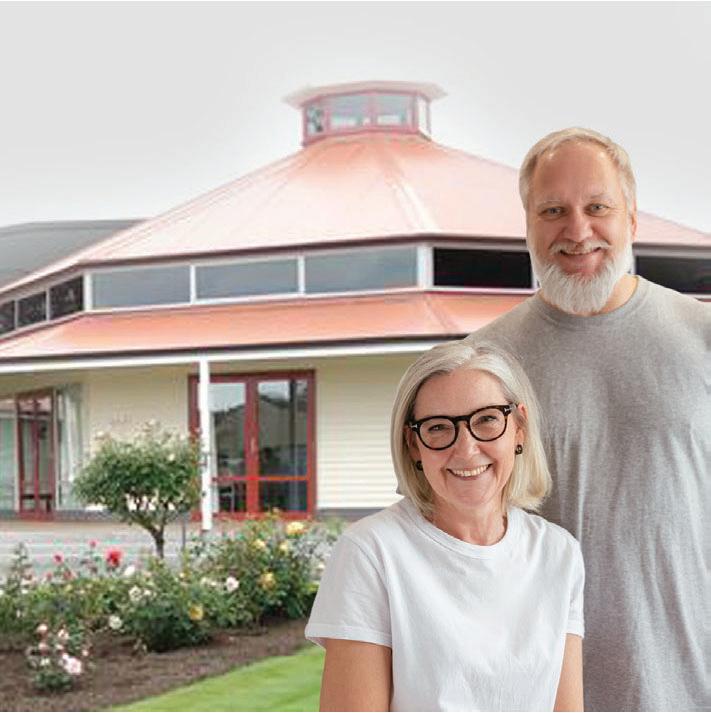
Keeping On eeping On 29 FEBRUARY 2024 Come and enjoy social interaction with other seniors… 442 Durham Street North, St Albans, Christchurch 8014 Telephone 372 9224 Website www.lcmchristchurch.org.nz Email nzadmin@lcm.org.au MONDAYS 9.00amBoard Games 10.00amMorning Tea 10.30amArts and Crafts 12.00noonBYO Lunch / Socialise 12.45pmExercise Class 1.30pmVariety Hour 2.30pmAfternoon Tea THURSDAYS 9.00amBoard Games 9.30amMass 10.00amMorning Tea 10.30amBoard Games 12.00noonBYO Lunch / Socialise 12.30pmHousie (numbers limited) 2.15pmAfternoon Tea 3.00pmExercise Class Gold coin donation for non-residents
Take time to look after your bones
Osteoporosis literally means ‘porous bone’. It is a condition that causes bones to become thin and fragile, decreasing bone strength and making them more prone to fractures. It is often called the ‘silent disease’ as bone loss occurs without any external symptoms.
The result is that bones break easily, even following a minor bump or fall. Healthcare professionals may refer to these broken bones as fragility fractures or osteoporotic fractures. These terms all mean the same thing. Fractures (bone breaks) can occur in any part of the body, the most common sites of a fragility fracture are the wrist, spine, shoulder and hip.Osteoporosis is sometimes confused with osteoarthritis.
Osteoporosis is a bone disease; osteoarthritis is a disease of the joints and surrounding tissue. Fractures due to osteoporosis are a major cause of pain and often means that there is long-term disability and loss of independence among older adults. Osteoporosis can even result in premature death.
The good news is that there are many ways to prevent and manage osteoporosis at every stage of life. Take charge of your bone health today!
Children and adolescents need to BUILD maximum peak bone mass.
Adults need to MAINTAIN healthy bones and avoid premature bone loss.
Older people need to SUSTAIN mobility and independence.
Building strong bones throughout your lifetime means you can continue to do the things you enjoy for longer. To reach optimal peak bone mass and continue building and maintaining bone tissue as you get older:
• Exercise regularly
• Eat well

• Create healthy lifestyle habits
• Talk to your doctor about the risk factors you might have
Exercise regularly
Ideally you should aim to do at least 30 minutes of weight-bearing physical activity every day. The best exercises for bones are ones that work your muscles against gravity. Some examples are walking briskly, jogging, tennis, dancing, low-impact aerobics, or golf. Resistance training or muscle strengthening exercises that suit your needs and abilities will help improve coordination and balance. This helps to maintain mobility and reduce the risk of falls and fractures.
Vitamin D
Vitamin D is essential for the absorption of calcium from the diet, bone development, control of cell growth and immune functioning, and has also been linked with the prevention of muscle weakness, which is important for preventing falls.
When vitamin D levels are very low
Osteoporosis New Zealand
Our vision is better bones and fewer fractures for New Zealanders.
Our mission is to make this happen by engagement with the public, health professionals, policymakers and the private sector, through programmes of awareness, advocacy and education, to prevent fractures caused by osteoporosis.
Phone 04 499 4862 or Email info@osteoporosis.org.nz
Osteoporosis New Zealand, PO Box 688, Wellington 6140

your bones suffer. The best source of Vitamin D is sunlight. Vitamin D is naturally created in the skin from exposure to sunlight. For Vitamin D synthesis, exposure must be to direct sunlight as UVB does not pass-through glass. In New Zealand exposure should be restricted at high UV times. For most people, vitamin

D deficiency can be prevented by 5 –15 minutes’ exposure of face, arms, and hands to sunlight 4 – 6 times per week. In winter (May to August) a brisk walk or other form of outdoor physical activity around the middle of the day is a good way to increase your vitamin D.
In Summer (September to April) it is important to understand that any sun exposure between the hours of 10am to 4pm can increase the risk of skin cancer. Remember it is essential to slip, slop, slap and wrap during these hours. It is best to schedule outdoor activity to early morning or late afternoon.
Individuals who never go outside (if they are frail or unwell), those who are veiled, and those who have dark skin, are at risk of vitamin D deficiency, so might benefit from a vitamin D supplement. The use of supplements by those who are not deficient does not improve bone health. Most healthy European New Zealand adults living independently do not require vitamin D supplements.
Mon.
Mon.10.30am Parklands Gym, Parklands Community Centre, 77 Queens Park Drive.
Mon 1.00pm Harewood (Waitlist) St James Church Hall, Harewood Road, airport end
Mon 1.00pm Halswell Te Hapua, Halswell Service Centre & Library, 341 Halswell Rd
Mon 2.00pm Harewood (Waitlist) St James Church Hall, Harewood Rd, airport end
Tues 9.30am Papanui (Waitlist) Age Concern Canterbury, 24 Main North Road, Papanui.
Tues. 10.00am South Brighton South Brighton Community Centre, Beattie Street.
Tues. 10.00am St Albans (Waitlist) Lamb of God Community Centre, 21 Thames Street, St Albans.
Tues. 10.00am Fendalton St Barnabas Church Hall, Fendalton. Christchurch.
Tues. 10.00am Aranui (20th Feb. ’24) Salvation Army Centre, 32 Portsmouth Street, Aranui.
Tues 10.30am Bryndwr Bryndwr Chapel, 179 Idris Road, Bryndwr.
Tues. 1.00pm Burnside (Waitlist) Wairakei Road Bible Church, 392 Wairakei Road, Burnside.
Tues 1.30pm Hornby (Waitlist) Community Care Centre, Goulding Avenue, Hornby.
Tues 2.00pm Waltham (Waitlist) Waltham Community Cottage, 201 Hastings St East.
Wed 11.00am Halswell (Waitlist) Te Hapua, Halswell Service Centre & Library, 341 Halswell Rd.
Wed 1.30pm Lincoln Lincoln Community Care, Lyttelton St, Lincoln.
Wed. 2.00pm Papanui (Waitlist) Age Concern Canterbury, 24 Main North Road, Papanui.
Thurs 10.00am Heathcote Malt Works Villa Hall, Port Hills Rd, Heathcote.
Thurs 9.30am St Albans St Albans Community Centre, 1049 Colombo Street, St Albans.
Thurs 10.30am Avonside/Linwood (Waitlist) Holy Trinity Church, 168 Stanmore Road, Avonside/Linwood.
Thurs. 11.00am Avonhead St Christophers Church, 244 Avonhead Road, Avonhead.
Fri 9.30am Hoon Hay (Waitlist) Hoon Hay Presbyterian Church Lounge, 5 Downing St.
Fri 10.00am New Brighton (Waitlist) New Brighton Library – in the Pay and Display Room
Fri 10.00am Opawa Opawa Community Church, cnr Opawa Rd and Aynsley
FEBRUARY 2024 Keeping On eeping On 30
For more information about groups please phone Age Concern Canterbury 366 0903. A koha of $2.00 is appreciated. Each class is a one - hour session. CHRISTCHURCH CITY AND SOUTH Day /Time AREA Location of class Mon 10.00am St Albans St Albans Community Centre, 1049 Colombo Street.
10.00am Redcliffs Port Hills Uniting Church, Augusta St, Recliffs.
Mon
10.00am Redwood
Redwood Library, 339 Main North Road, Redwood.
10.30am Wainoni Celebration Centre, 81 Bickerton Street, Wainoni.
10.30am Hei
Wycola
(19th Feb. ’24)
Mon
Mon
Hei
Ave Community Centre, Hei Hei, Christchurch.
Tce. Fri. 11.00am Opawa Opawa Community Church, cnr Opawa Rd and Aynsley Tce. NORTH CANTERBURY Day time AREA Location of class Tues 10.00am Rangiora (Waitlist) RSA Hall, Victoria Street, Rangiora. Tues. 11.00am Rangiora RSA Hall, Victoria Street, Rangiora. Wed 10.00am Rangiora Ballarat Retirement Village, 21 Ballarat Rd, Rangiora. Wed 11.00am Amberley Amberley Library, RSA Room, Amberley. Wed. 10.00am Waikuku Beach (17th Jan. ’24) Waikuku Beach Hall, 1 Bridge Street, Waikuku. Thurs 10.30am Rotherham Rotherham Hotel, 42 George St, Rotherham. Thurs 10.00am Oxford Jaycee Hall, 56 Main Street. Oxford. Thurs 1.30pm Rangiora RSA Hall, Victoria Street, Rangiora. Thurs 1.30pm Pegasus Pegasus Community Centre, Cnr Pegasus Main and Tahuna St. Thurs 1.30pm Kaiapoi ($3.00) (From 25th Jan.’24) Anglican Church, 23 Cass Street, Kaiapoi. Steady As You Go (SAYGo) Falls Prevention – Exercise Classes in Canterbury (December 2023)
Exercise and Vitamin D through sunlight are great ways to help prevent osteoporosis.

Health promoter chit chat
Hi Keeping On readers, and welcome. In this edition I’m having a chat around exercising if you have limited mobility and how important it is to realise that you don’t need to have full mobility to experience the health benefits of exercise. Being active is such an important part of healthy ageing.
Finding an activity or exercise programme that is right for you will improve your strength, flexibility, circulation, balance and range of motion, helping to reduce your risk of falls. Regular exercise will also help you manage pain, decrease stress and anxiety levels, lower your risk of chronic disease and help you stay as independent as possible.
For older adults with mobility challenges, seated chair exercises are a great way to get moving safely and can be just as challenging as a standing workout.
If you are at all concerned about starting an exercise programme, speak to a health professional before you start. Take it slow, know your limits and listen to your body.
Wrist and ankle rolls
Many older adults experience poor circulation to their limbs which can cause stiff joints and balance and mobility challenges. Start by waking up your hands and feet as a warm-up before moving on to more strenuous chair exercises.
Sit on your chair without leaning against the chair back and have your feet flat on the ground.
Open and close your fists 5 times extending your fingers, then roll your
by Anna Tillman, Health Promoter, Age Concern Canterbury.
wrists 10 times in each direction.
Now do the same exercises with your feet. Extend your right leg, lift your foot off the ground and point and flex your toes 10 times. Then roll your ankle 10 times to the outside and 10 times to the inside. Repeat on the left side.
Knee Marches
High knee marches will help with hip mobility, range of motion and get your heart pumping and blood flowing.
Sit tall on your chair, hold the edges or armrests with your hands and place your feet flat on the ground hipdistance apart.
Lift your right leg with a bent knee towards your chest as high as you comfortably can.
Slowly lower your right foot and then lift your left leg towards your chest. Repeat this and aim for a total of 10-20 marches. Work up to doing 3 rounds of 20 marches with breaks between sets.
Seated Rows
As we age, changes in our posture can lead to a rounded spine and back pain. This exercise will strengthen your chest and upper back muscles to help correct posture problems.
Sit on the edge of the chair with your feet flat on the ground and with your arms out in front of you, elbows softly bent and thumbs pointing up towards the ceiling.
Pull your elbows back, squeezing your shoulder blades together to target the upper back and chest muscles. Return to the starting position and repeat 8-10 times.
Arm Raises
This exercise will strengthen your shoulders and arms to help you with lifting movements.
With your feet flat on the floor and your back straight, hold a ball between your palms.
Stretch your arms so the ball is resting on your legs, ensuring that your elbows are still slightly bent.
Slowly raise your arms lifting the ball to shoulder level then lower it back down to your legs. To modify this exercise based on your fitness level, these arm raises can also be done without the ball to start, or a light weight can be added for increased resistance. Repeat 8-10 times.
Seated Torso twist
This exercise is designed to work the core that includes the abdominal, back, hip and pelvic muscles. A strong core supports and stabilizes the spine to make everyday activities easier and to prevent balance-related falls.
Sit tall with your feet on the floor and hip-distance apart, without leaning on the back of the chair.
If available, hold a ball between your palms, arms close to your body with elbows bent. Otherwise, place your hands across your chest.
Exhale and slowly twist to the left as far as is comfortable, without moving the rest of your body.
Inhale and return to the middle position, keeping your hips stable.
Exhale again slowly twisting to the right side as far you comfortably can.
Repeat this exercise until you’ve twisted to each side 8-10 times. For
progression, rest and then try another set.
Calf raises
Seated calf raises will increase your leg strength and circulation.
Sit tall in your chair with both feet planted on the floor, hip-distance apart.
Look straight ahead and lift your right heel off the ground as high as you can keeping your toes planted.
Lower your heel back to the floor. Repeat this movement until you have completed it 10 times.
Repeat the same movement on your left side for 10 repetitions.
Then lift both heels up at the same time and hold for 10 seconds, then slowly lower. Repeat 10 times.
You can modify these exercises depending on your mobility level or find other seated movements that work for you. An active lifestyle will not only benefit you mentally and physically but will also make everyday tasks like moving around the house, getting out of bed and reaching for things safer and easier.
If you find that these exercises are something that you really enjoy doing, please give me a call and have a chat to me about our community based Steady As You Go classes. A number of the exercises in these classes are done in sitting position and a weekly class might be just the right thing for you!
As always, happy exercising, and I look forward to hearing from you with any queries or suggestions. Email: anna.tillman@ageconcerncan.org.nz or phone: 03 331 7811.
Keeping On eeping On 31 FEBRUARY 2024 HEALTH AND WELLBEING 101 MYTHBUSTING What science shows: Your body processes all simple sugars the same way. By all means use honey or maple syrup or agave syrup if you prefer how they taste but know that they are treated the same way by your digestive system. The only exception is the sugar in fruit (but not fruit juice) because the sugar in fruit comes along with fibre and a host of health-promoting compounds. The jury is out on low calorie sweeteners (i.e., artificial sugars) with research showing mixed findings. Aspartame, the sweetener in Coke Zero and Diet Coke, is one of the most studied chemical compounds on the planet. If there is any risk associated with it, that risk is very small. You need 10,000 steps a day to be healthy Running will damage your knees You must drink 2 litres of water each day Prevent Injuries through RICE Everyone should take a daily multivitamin Only certain types of people develop a mental illness What science shows: The concept of 10,000 steps a day started with a marketing gimmick and not medical science. It originated with the manufacturer of an early Japanese pedometer and arose because the Japanese character for “10,000” looks like a person walking. There is nothing magical about the 10,000 step number. While movement is certainly good for you it is not a dose-response relationship so more can actually be less. What science shows: Recent studies demonstrate that rather than damaging your knees, running may protect them. One large study found that runners were half as likely to develop knee osteoarthritis compared with non-runners. Runners typically have stronger quadriceps muscles, which helps to protect the joint. Davis’s Law, named after the orthopaedic surgeon and researcher Henry Gassett Davis, states that soft tissues respond to load in the same way that bones do. What science shows: Everyone has different hydration needs and should adjust their water intake accordingly based on their activity level and signs of dehydration. The colour of your urine can be a good indicator of your hydration status. If your urine is clear more often than not, it can be a sign that you’re drinking too much water. What science shows: Movement is the fastest way to repair injury. Instead of RICE think MEAT - Movement, Exercise, Analgesics, Treatment. Find a routine of gentle movement without exceeding pain tolerance. These movements will put a small amount of load on the injured tissue, helping the new tissue to grow back in the right way. What science shows: A 2022 review of 84 studies by the U.S. Preventive Services Task Force found no convincing evidence that multivitamins have any benefit for nonpregnant adults. The science says we’ll get better returns from eating a healthy diet with plenty of fruits and different vegetables. What science shows: As many as one in five people may develop a mental illness at some stage in their lives. Everyone is vulnerable to mental health problems. It affects people regardless of age, education, income or culture. Breakfast is the most important meal of the day Everyone needs eight hours of sleep It’s good to occasionally go on a detox to cleanse your body of toxins Natural sugars are better for you than refined sugar What science shows: The idea that breakfast is the most important meal of the day was created by breakfast cereal companies. In reality it’s fine to skip breakfast. Indeed, the science behind intermittent fasting suggests that skipping breakfast could benefit you more than eating it. What really matters is the quantity and quality of calories you consume throughout the day and not the time at which they’re consumed What science says: Everyone has a unique circadian rhythm that determines how much sleep is optimal for them. While seven to nine hours is still the standard recommendation for adults, you should treat sleep like hydration and exercise: Get enough so that you feel your best and keep your body healthy, but not so much that it starts affecting you negatively. You can always have too much of a good thing, even sleep. What science says: There is no need for anyone to ‘detox’ as our bodies are built to get rid of toxins much more effectively than any diet or treatment can. Probably the best way to protect your body’s detoxification process would be to take care of the liver and the kidney, which are the body’s main organs in detoxification. To do so, avoid processed and packaged foods like fries, limit your intake of sugary foods, fatty foods and alcohol.
My two cents
by June Peka
The sport of fishing observation
I’ve been inducted into the spectator sport of fishing observation. At time of writing I’m about to be taken to the mouth of the Waimakariri for my third experience which I feel entitles me to opine on the subject. Stemming from my appreciation of kahawai on the plate, the noting of its emergence from current to land is a natural progression.
Day One was sunny and breezy; a perfect place for coffee and a scribble. No fish. Ditto Day Two except for a doltish youth roaring about for a few minutes like a Jehu in his white ute, encouraged by a potty-mouthed girlfriend. My catch of the day was a large plastic bag which I managed to fill in 10 minutes, within three or four metres of my ringside seat, with four kilos of bottles, cans, and countless metres of nylon line snagged

amongst driftwood. I couldn’t bring myself to pick up the dozen maggoty heads and tails strewn amongst the walking tracks.
What appeared to be an older father and son duo were the only catchers on Day Two, giving their two good-sized fish to the Filipino family beside them. The mother in that group then offered me one, but
there being only two of us, and with another feed or two in the freezer, I declined, making a mental note to take some lemons and green vegies on the next foray. When I told our good friend, fisherman David Morris about this generosity, he mentioned that he and a friend had caught 20 the day before, giving 15 away to notso-lucky fishers.
David’s river mouth fishing tips and etiquette:
1) Drive slowly and don’t park on access ways.
2) Cast upstream to allow lures to float.
3) If another fisher has a fish on their line, wait for them to land it before you cast in again.
4) Fillet and clean your fish at home, using waste for garden fertilizer. If you have to do it on-site return waste to the food chain. Don’t leave it on the beach.
5) Take all rubbish home, especially tangled line which is a danger to birds and animals.
6) Remember that crossed lines are inevitable. Be courteous.
7) Don’t catch more than can be used or shared.
Kihikihiwawa, the chorus cicada
If I was fifty years younger I’d let some rich dude buy me a wide American car with white-walled tyres. I’d don my flash sunnies and a polkadotted head scarf to suppress my blonde tresses from flying free in the playful summer zephyr, and I’d drive up and down Harper Avenue at least 50 times a day. That’s how much I love cicadas.
Fifty years ago I was very blonde about cicadas. I had no idea that more than 40 species of them are both native and endemic to New Zealand. Or that here in Christchurch we are particularly blessed with Amphipsalta Zelandica, the chorus cicada, known to Maori as kihikihiwawa for the sound he makes. He’s our loudest with a wingspan as wide as a hand
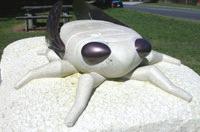
palm – about 80mm.
I remember the first time I became truly cicada-aware, as a teenager in the 60s. Mum had chummed up with a nice chap with three kids. The oldest one, Ron Hardgrave, worked on large vehicles. Mum and I had one of those energising, amazing, hysterical joint fits of laughter as Ron related one evening how he’d that day been working on a big truck in the
yard, when he casually mentioned to a workmate, “wow, listen to those cicadas”. “What?” came the reply. Ron said again, and on the fourth repeat roared gustily “LISTEN TO THOSE BLOODY F***ING CICADAS” just as the motor died and a bevy of nuns glided by serenely. In those times that sort of language could land one before the beak.
I had reason to look up cicadas recently. I found that only the males make the amazing sound that took Ronny’s ear. The loudest African cicada can reach 107 decibels, the equivalent of a rock concert, and there’s another species here in NZ that can be heard only by children. Olly Hills from Hamilton wrote a real book on the subject (Cicadas
of New Zealand) when he was just 10-years-old. Cicadas shouldn’t be eaten by people with sea-food allergies, and one can buy cicada merchandise - particulary in Kihikihi - where a sculpture of this famous NZ’er graces the town’s northern entrance – ranging from T-shirts and tree-hangings, to healing oils and pounamu pendants.
But that’s not what I was looking for. No, I could hear cicadas in the night, in my bedroom, miles from Harper Ave, with the window shut. Turns out I’m a bit deaf because I have tinnitus, (or vice versa) which can manifest as ringing, buzzing, whooshing, humming, hissing, roaring, throbbing, clicking or cicadas. I got cicadas. How lucky am I, eh?
There’s nowt so queer as animals
There’s something in the water out back and I’m not alluding to the stink tank, although that’s most noteworthy indeed, with its floating horse poop and kahawai heads and long-tailled maggots. And the pong, OMG!!! Cousin Susan collects seaweed for hers too but neither of us picks up road kill as our fathers did.
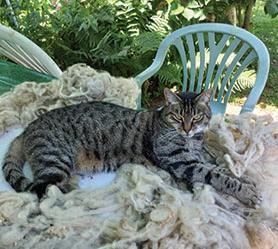
No, it’s the animals acting crazy. First it was the cat. There’s been a pile of sheep fleece on the table under the gazebo for months now, which she has treated with studied ignore. When out fire-wooding, Mac picks it from fence-line and fallen pine-coned branches, and brings it
home for me to “do something with.” Now on the hottest day of the year so far, 33 degrees, Tinks has claimed it, kneading it into a perfect nesty shape, whilst drooling and gazing off into lala land. Touch it if we dare.
And now her loopiness has rubbed off on the hens. The two old girls gave up laying 10 months ago, so in October we got pretty pullets Terri and Paulette. As you do, we separated them till they established the pecking order. There was a little argy-bargy when they were
reunited, but then one old chook started to make peculiar noises and sprouted a large red comb. No one believed me when I reported she was um, mounting the pullets, with enthusiasm, determination and great persistence – until I consulted the chook book and Dr Google. Apparently she may “come right” but if that queer noise becomes a cock’s crow in the wee hours, we may have to rethink her dignified retirement. She’s been threatened with the stink tank.
FEBRUARY 2024 Keeping On eeping On 32
Cicada sculpture in Kihikihi.
































































 by Carolyn Cooper, Aged Care Commissioner Carolyn Cooper
by Carolyn Cooper, Aged Care Commissioner Carolyn Cooper






















































































































